|
PLearn 0.1
|
|
PLearn 0.1
|
Multi-layer neural network trained with an efficient Natural Gradient optimization. More...
#include <NatGradSMPNNet.h>
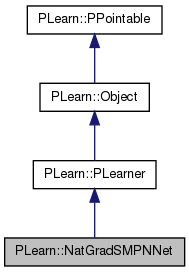
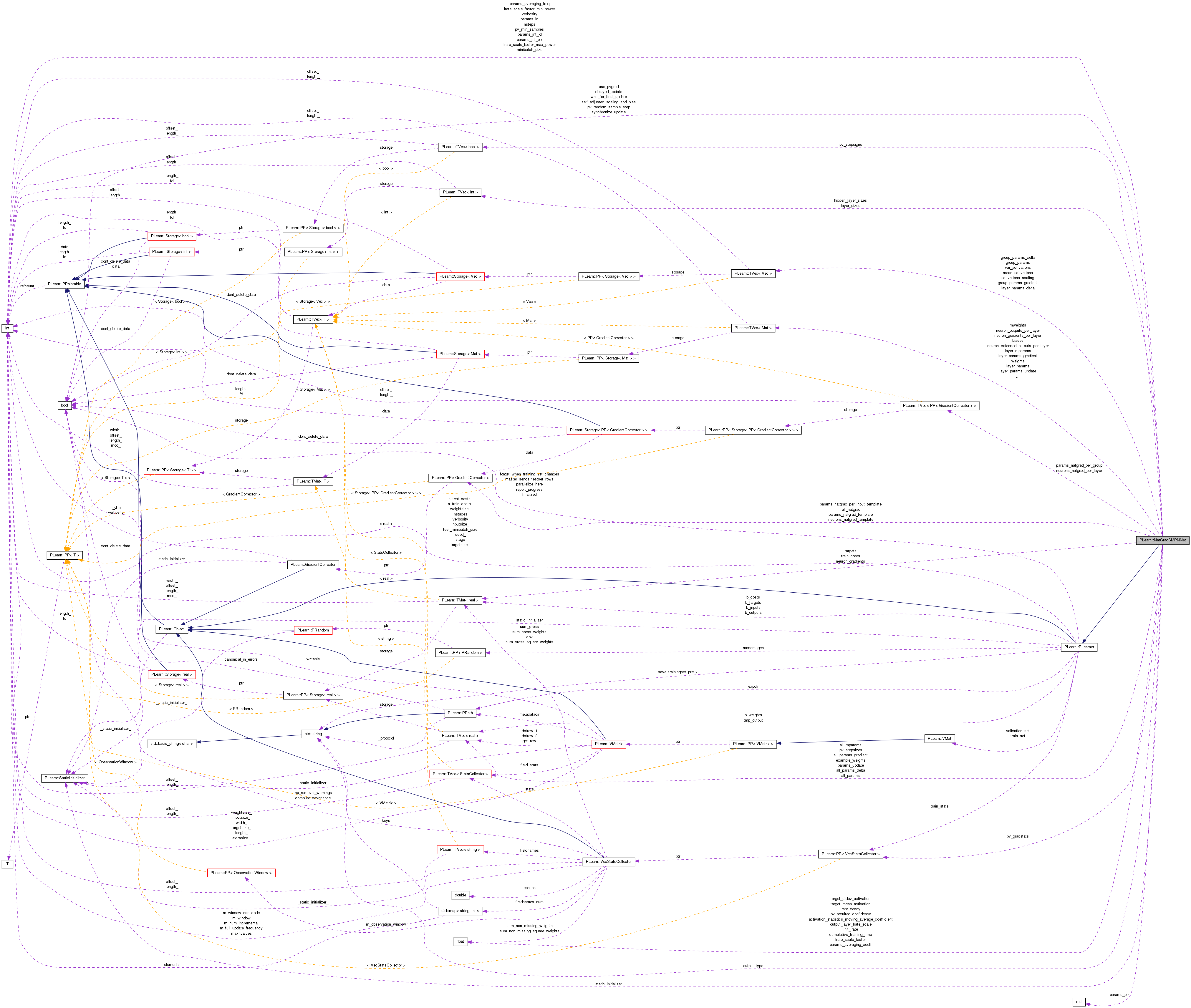
Public Member Functions | |
| NatGradSMPNNet () | |
| virtual | ~NatGradSMPNNet () |
| Destructor (to free shared memory). | |
| virtual int | outputsize () const |
| Returns the size of this learner's output, (which typically may depend on its inputsize(), targetsize() and set options). | |
| virtual void | forget () |
| (Re-)initializes the PLearner in its fresh state (that state may depend on the 'seed' option) and sets 'stage' back to 0 (this is the stage of a fresh learner!). | |
| virtual void | train () |
| The role of the train method is to bring the learner up to stage==nstages, updating the train_stats collector with training costs measured on-line in the process. | |
| virtual void | computeOutput (const Vec &input, Vec &output) const |
| Computes the output from the input. | |
| virtual void | computeCostsFromOutputs (const Vec &input, const Vec &output, const Vec &target, Vec &costs) const |
| Computes the costs from already computed output. | |
| virtual TVec< std::string > | getTestCostNames () const |
| Returns the names of the costs computed by computeCostsFromOutpus (and thus the test method). | |
| virtual TVec< std::string > | getTrainCostNames () const |
| Returns the names of the objective costs that the train method computes and for which it updates the VecStatsCollector train_stats. | |
| virtual string | classname () const |
| virtual OptionList & | getOptionList () const |
| virtual OptionMap & | getOptionMap () const |
| virtual RemoteMethodMap & | getRemoteMethodMap () const |
| virtual NatGradSMPNNet * | deepCopy (CopiesMap &copies) const |
| virtual void | build () |
| Finish building the object; just call inherited::build followed by build_() | |
| virtual void | makeDeepCopyFromShallowCopy (CopiesMap &copies) |
| Transforms a shallow copy into a deep copy. | |
Static Public Member Functions | |
| static string | _classname_ () |
| static OptionList & | _getOptionList_ () |
| static RemoteMethodMap & | _getRemoteMethodMap_ () |
| static Object * | _new_instance_for_typemap_ () |
| static bool | _isa_ (const Object *o) |
| static void | _static_initialize_ () |
| static const PPath & | declaringFile () |
Public Attributes | |
| bool | delayed_update |
| bool | wait_for_final_update |
| bool | synchronize_update |
| int | noutputs |
| TVec< int > | hidden_layer_sizes |
| sizes of hidden layers, provided by the user. | |
| TVec< Mat > | layer_params |
| layer_params[i] is a matrix of dimension layer_sizes[i+1] x (layer_sizes[i]+1) containing the neuron biases in its first column. | |
| TVec< Mat > | layer_mparams |
| mean layer_params, averaged over past updates (moving average) | |
| real | params_averaging_coeff |
| mparams <-- (1-params_averaging_coeff)mparams + params_averaging_coeff*params | |
| int | params_averaging_freq |
| how often (in terms of minibatches, i.e. weight updates) do we perform the above? | |
| real | init_lrate |
| initial learning rate | |
| real | lrate_decay |
| learning rate decay factor | |
| real | output_layer_L1_penalty_factor |
| L1 penalty applied to the output layer's parameters. | |
| real | output_layer_lrate_scale |
| scaling factor of the learning rate for the output layer | |
| int | minibatch_size |
| update the parameters only so often | |
| PP< GradientCorrector > | neurons_natgrad_template |
| natural gradient estimator for neurons (if 0 then do not correct the gradient on neurons) | |
| TVec< PP< GradientCorrector > > | neurons_natgrad_per_layer |
| PP< GradientCorrector > | params_natgrad_template |
| natural gradient estimator for the parameters within each neuron (if 0 then do not correct the gradient on each neuron weight) | |
| PP< GradientCorrector > | params_natgrad_per_input_template |
| natural gradient estimator solely for the parameters of the first layer. | |
| TVec< PP< GradientCorrector > > | params_natgrad_per_group |
| the above templates are used by the user to specifiy all the elements of the vector below | |
| PP< GradientCorrector > | full_natgrad |
| optionally, if neurons_natgrad==0 and params_natgrad_template==0, one can have regular stochastic gradient descent, or full-covariance natural gradient using the natural gradient estimator below | |
| string | output_type |
| type of output cost: "NLL" for classification problems, "MSE" for regression | |
| real | input_size_lrate_normalization_power |
| 0 does not scale the learning rate 1 scales it by 1 / the nb of inputs of the neuron 2 scales it by 1 / sqrt(the nb of inputs of the neuron) etc. | |
| real | lrate_scale_factor |
| scale the learning rate in different neurons by a factor taken randomly as follows: choose integer n uniformly between lrate_scale_factor_min_power and lrate_scale_factor_max_power inclusively, and then scale learning rate by lrate_scale_factor^n. | |
| int | lrate_scale_factor_max_power |
| int | lrate_scale_factor_min_power |
| bool | self_adjusted_scaling_and_bias |
| Let each neuron self-adjust its bias and scaling factor of its activations so that the mean and standard deviation of the activations reach the target_mean_activation and target_stdev_activation. | |
| real | target_mean_activation |
| real | target_stdev_activation |
| real | activation_statistics_moving_average_coefficient |
| int | verbosity |
| Level of verbosity. | |
| bool | use_pvgrad |
| Stages for profiling the correlation between the gradients' elements. | |
| real | pv_initial_stepsize |
| Initial size of steps in parameter space. | |
| real | pv_acceleration |
| Coefficient by which to multiply/divide the step sizes. | |
| int | pv_min_samples |
| PV's gradient minimum number of samples to estimate confidence. | |
| real | pv_required_confidence |
| Minimum required confidence (probability of being positive or negative) for taking a step. | |
| bool | pv_random_sample_step |
| If this is set to true, then we will randomly choose the step sign for. | |
Static Public Attributes | |
| static StaticInitializer | _static_initializer_ |
Protected Member Functions | |
| void | onlineStep (int t, const Mat &targets, Mat &train_costs, Vec example_weights) |
| one minibatch training step | |
| void | fpropNet (int n_examples, bool during_training) const |
| compute a minibatch of size n_examples network top-layer output given layer 0 output (= network input) (note that log-probabilities are computed for classification tasks, output_type=NLL) | |
| void | fbpropLoss (const Mat &output, const Mat &target, const Vec &example_weights, Mat &train_costs) const |
| compute train costs given the network top-layer output and write into neuron_gradients_per_layer[n_layers-2], gradient on pre-non-linearity activation | |
| void | pvGradUpdate () |
| gradient computation and weight update in Pascal Vincent's gradient technique | |
Static Protected Member Functions | |
| static void | declareOptions (OptionList &ol) |
| Declares the class options. | |
| static void | declareMethods (RemoteMethodMap &rmm) |
| Declares the class methods. | |
Protected Attributes | |
| PP< VecStatsCollector > | pv_gradstats |
| accumulated statistics of gradients on each parameter. | |
| Vec | pv_stepsizes |
| The step size (absolute value) to be taken for each parameter. | |
| TVec< bool > | pv_stepsigns |
| Indicates whether the previous step was positive (true) or negative (false) | |
| int | n_layers |
| number of layers of weights (2 for a neural net with one hidden layer) | |
| TVec< int > | layer_sizes |
| layer sizes (derived from hidden_layer_sizes, inputsize_ and outputsize_) | |
| TVec< Mat > | biases |
| pointers into the layer_params | |
| TVec< Mat > | weights |
| TVec< Mat > | mweights |
| TVec< Vec > | activations_scaling |
| TVec< Vec > | mean_activations |
| TVec< Vec > | var_activations |
| real | cumulative_training_time |
Private Types | |
| typedef PLearner | inherited |
Private Member Functions | |
| void | build_ () |
| This does the actual building. | |
| void | freeSharedMemory () |
| Free shared memory that may still be allocated. | |
Private Attributes | |
| Vec | all_params |
| Vec | all_params_delta |
| Vec | all_params_gradient |
| Vec | all_mparams |
| TVec< Mat > | layer_params_gradient |
| TVec< Vec > | layer_params_delta |
| TVec< Vec > | group_params |
| TVec< Vec > | group_params_delta |
| TVec< Vec > | group_params_gradient |
| Mat | neuron_gradients |
| TVec< Mat > | neuron_gradients_per_layer |
| TVec< Mat > | neuron_outputs_per_layer |
| TVec< Mat > | neuron_extended_outputs_per_layer |
| Mat | targets |
| Vec | example_weights |
| Mat | train_costs |
| real * | params_ptr |
| int | params_id |
| int * | params_int_ptr |
| int | params_int_id |
| int | nsteps |
| Number of samples seen since the last global parameter update. | |
| int | semaphore_id |
| Semaphore used to control which CPU must perform an update. | |
| Vec | params_update |
| Used to store the cumulative updates to the parameters, when the 'delayed_update' option is set. | |
| TVec< Mat > | layer_params_update |
| Used to store updates to the parameters of each layer (points into the 'params_update' vector). | |
Multi-layer neural network trained with an efficient Natural Gradient optimization.
Definition at line 53 of file NatGradSMPNNet.h.
typedef PLearner PLearn::NatGradSMPNNet::inherited [private] |
Reimplemented from PLearn::PLearner.
Definition at line 55 of file NatGradSMPNNet.h.
| PLearn::NatGradSMPNNet::NatGradSMPNNet | ( | ) |
Definition at line 74 of file NatGradSMPNNet.cc.
References PLearn::PLearner::random_gen.
:
delayed_update(true),
wait_for_final_update(true),
synchronize_update(false),
noutputs(-1),
params_averaging_coeff(1.0),
params_averaging_freq(5),
init_lrate(0.01),
lrate_decay(0),
output_layer_L1_penalty_factor(0.0),
output_layer_lrate_scale(1),
minibatch_size(1),
output_type("NLL"),
input_size_lrate_normalization_power(0),
lrate_scale_factor(3),
lrate_scale_factor_max_power(0),
lrate_scale_factor_min_power(0),
self_adjusted_scaling_and_bias(false),
target_mean_activation(-4), //
target_stdev_activation(3), // 2.5% of the time we are above 1
verbosity(0),
//corr_profiling_start(0),
//corr_profiling_end(0),
use_pvgrad(false),
pv_initial_stepsize(1e-6),
pv_acceleration(2),
pv_min_samples(2),
pv_required_confidence(0.80),
pv_random_sample_step(false),
pv_gradstats(new VecStatsCollector()),
n_layers(-1),
cumulative_training_time(0),
params_ptr(NULL),
params_id(-1),
params_int_ptr(NULL),
params_int_id(-1),
nsteps(0),
semaphore_id(-1)
{
random_gen = new PRandom();
}
| PLearn::NatGradSMPNNet::~NatGradSMPNNet | ( | ) | [virtual] |
Destructor (to free shared memory).
Definition at line 1625 of file NatGradSMPNNet.cc.
References freeSharedMemory(), PLERROR, and semaphore_id.
{
freeSharedMemory();
if (semaphore_id >= 0) {
int success = semctl(semaphore_id, 0, IPC_RMID);
if (success < 0)
PLERROR("In NatGradSMPNNet::train - Could not remove previous "
"semaphore (errno = %d)", errno);
semaphore_id = -1;
}
}

| string PLearn::NatGradSMPNNet::_classname_ | ( | ) | [static] |
Reimplemented from PLearn::PLearner.
Definition at line 72 of file NatGradSMPNNet.cc.
| OptionList & PLearn::NatGradSMPNNet::_getOptionList_ | ( | ) | [static] |
Reimplemented from PLearn::PLearner.
Definition at line 72 of file NatGradSMPNNet.cc.
| RemoteMethodMap & PLearn::NatGradSMPNNet::_getRemoteMethodMap_ | ( | ) | [static] |
Reimplemented from PLearn::PLearner.
Definition at line 72 of file NatGradSMPNNet.cc.
Reimplemented from PLearn::PLearner.
Definition at line 72 of file NatGradSMPNNet.cc.
| Object * PLearn::NatGradSMPNNet::_new_instance_for_typemap_ | ( | ) | [static] |
Reimplemented from PLearn::Object.
Definition at line 72 of file NatGradSMPNNet.cc.
| StaticInitializer NatGradSMPNNet::_static_initializer_ & PLearn::NatGradSMPNNet::_static_initialize_ | ( | ) | [static] |
Reimplemented from PLearn::PLearner.
Definition at line 72 of file NatGradSMPNNet.cc.
| void PLearn::NatGradSMPNNet::build | ( | ) | [virtual] |
Finish building the object; just call inherited::build followed by build_()
Reimplemented from PLearn::PLearner.
Definition at line 600 of file NatGradSMPNNet.cc.
References PLearn::PLearner::build(), and build_().
Referenced by train().
{
inherited::build();
build_();
}
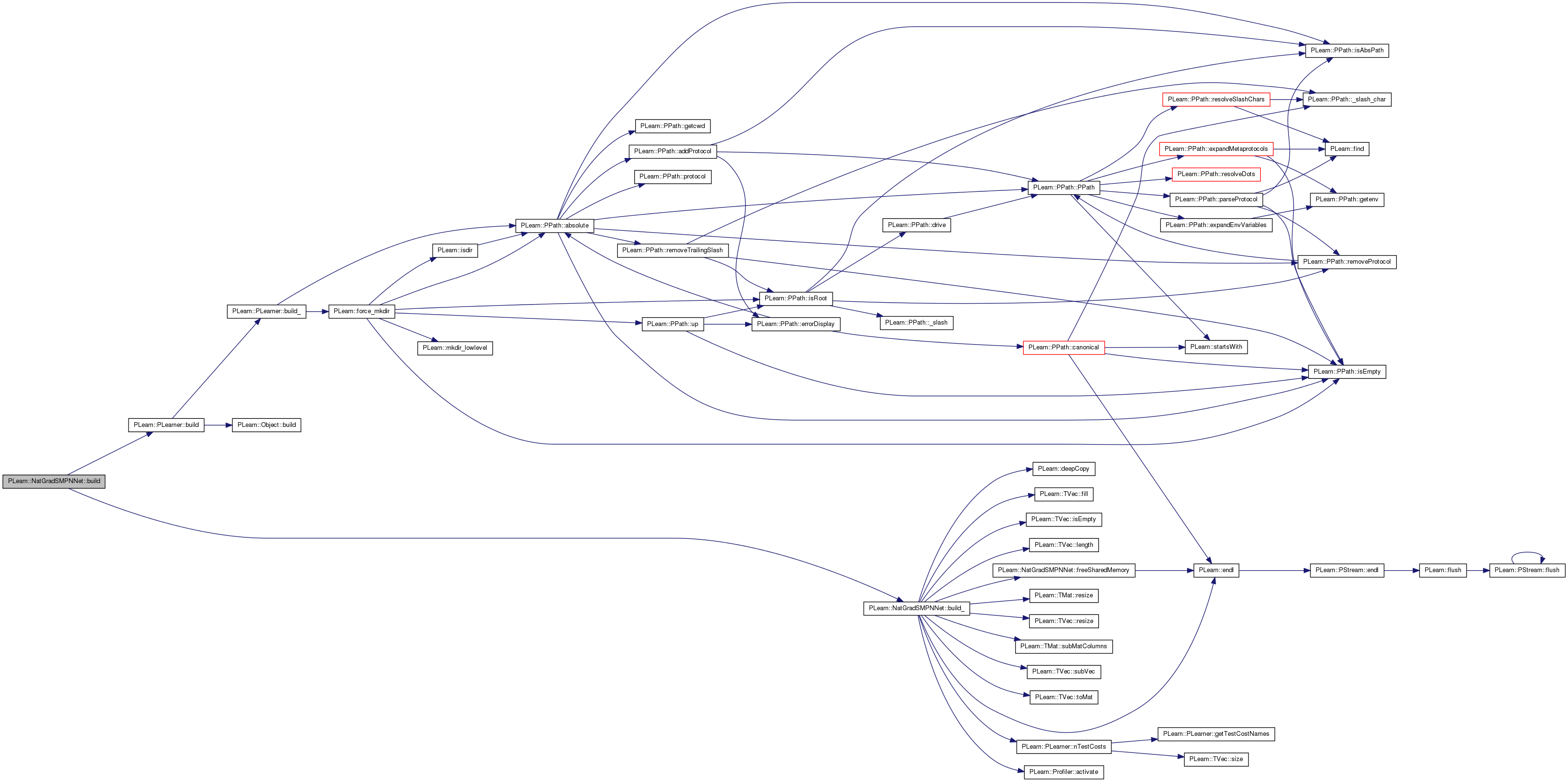

| void PLearn::NatGradSMPNNet::build_ | ( | ) | [private] |
This does the actual building.
Reimplemented from PLearn::PLearner.
Definition at line 385 of file NatGradSMPNNet.cc.
References PLearn::Profiler::activate(), activations_scaling, all_mparams, all_params, all_params_delta, all_params_gradient, biases, PLearn::deepCopy(), delayed_update, PLearn::endl(), example_weights, PLearn::TVec< T >::fill(), freeSharedMemory(), group_params, group_params_delta, group_params_gradient, hidden_layer_sizes, i, PLearn::PLearner::inputsize_, PLearn::TVec< T >::isEmpty(), j, layer_mparams, layer_params, layer_params_delta, layer_params_gradient, layer_params_update, layer_sizes, PLearn::TVec< T >::length(), mean_activations, minibatch_size, mweights, n_layers, neuron_extended_outputs_per_layer, neuron_gradients, neuron_gradients_per_layer, neuron_outputs_per_layer, neurons_natgrad_per_layer, neurons_natgrad_template, noutputs, PLearn::PLearner::nTestCosts(), output_layer_L1_penalty_factor, output_type, params_id, params_int_id, params_int_ptr, params_natgrad_per_group, params_natgrad_per_input_template, params_natgrad_template, params_ptr, params_update, PLASSERT_MSG, PLCHECK, PLCHECK_MSG, PLERROR, PLWARNING, PLearn::TMat< T >::resize(), PLearn::TVec< T >::resize(), PLearn::TMat< T >::subMatColumns(), PLearn::TVec< T >::subVec(), synchronize_update, PLearn::PLearner::targetsize_, PLearn::TVec< T >::toMat(), train_costs, PLearn::PLearner::train_set, use_pvgrad, var_activations, and weights.
Referenced by build().
{
if (!train_set)
return;
inputsize_ = train_set->inputsize();
if (output_type=="MSE")
{
if (noutputs<0) noutputs = targetsize_;
else PLASSERT_MSG(noutputs==targetsize_,"NatGradSMPNNet: noutputs should be -1 or match data's targetsize");
}
else if (output_type=="NLL")
{
if (noutputs<0)
PLERROR("NatGradSMPNNet: if output_type=NLL (classification), one \n"
"should provide noutputs = number of classes, or possibly\n"
"1 when 2 classes\n");
}
else if (output_type=="cross_entropy")
{
if(noutputs!=1)
PLERROR("NatGradSMPNNet: if output_type=cross_entropy, then \n"
"noutputs should be 1.\n");
}
else PLERROR("NatGradSMPNNet: output_type should be cross_entropy, NLL or MSE\n");
if( output_layer_L1_penalty_factor < 0. )
PLWARNING("NatGradSMPNNet::build_ - output_layer_L1_penalty_factor is negative!\n");
if(use_pvgrad && minibatch_size!=1)
PLERROR("PV's gradient technique (triggered by use_pvgrad): support for minibatch not yet implemented (must have minibatch_size=1)");
while (hidden_layer_sizes.length()>0 && hidden_layer_sizes[hidden_layer_sizes.length()-1]==0)
hidden_layer_sizes.resize(hidden_layer_sizes.length()-1);
n_layers = hidden_layer_sizes.length()+2;
layer_sizes.resize(n_layers);
layer_sizes.subVec(1,n_layers-2) << hidden_layer_sizes;
layer_sizes[0]=inputsize_;
layer_sizes[n_layers-1]=noutputs;
if (!layer_params.isEmpty())
PLERROR("In NatGradSMPNNet::build_ - Currently, one can only build "
"a network from scratch");
layer_params.resize(n_layers-1);
layer_mparams.resize(n_layers-1);
layer_params_delta.resize(n_layers-1);
layer_params_gradient.resize(n_layers-1);
layer_params_update.resize(n_layers - 1);
biases.resize(n_layers-1);
activations_scaling.resize(n_layers-1);
weights.resize(n_layers-1);
mweights.resize(n_layers-1);
mean_activations.resize(n_layers-1);
var_activations.resize(n_layers-1);
int n_neurons=0;
int n_params=0;
for (int i=0;i<n_layers-1;i++)
{
n_neurons+=layer_sizes[i+1];
n_params+=layer_sizes[i+1]*(1+layer_sizes[i]);
}
// Allocate shared memory for parameters.
freeSharedMemory(); // First deallocate memory if needed.
long total_memory_needed = long(n_params) * sizeof(real);
params_id = shmget(IPC_PRIVATE, total_memory_needed, 0666 | IPC_CREAT);
DBG_MODULE_LOG << "params_id = " << params_id << endl;
if (params_id == -1) {
PLERROR("In NatGradSMPNNet::build_ - Error while allocating shared "
"memory (errno = %d)", errno);
}
params_ptr = (real*) shmat(params_id, 0, 0);
PLCHECK( params_ptr );
long total_int_memory_needed = 1 * sizeof(int);
params_int_id = shmget(IPC_PRIVATE, total_int_memory_needed, 0666 | IPC_CREAT);
DBG_MODULE_LOG << "params_int_id = " << params_int_id << endl;
PLCHECK( params_int_id != -1 );
params_int_ptr = (int*) shmat(params_int_id, 0, 0);
PLCHECK( params_int_ptr );
// We should have copied data from 'all_params' first if there were some!
PLCHECK_MSG( all_params.isEmpty(), "Multiple builds not implemented yet" );
all_params = Vec(n_params, params_ptr);
all_params.resize(n_params);
all_mparams.resize(n_params);
all_params_gradient.resize(n_params);
all_params_delta.resize(n_params);
params_update.resize(n_params);
params_update.fill(0);
// depending on how parameters are grouped on the first layer
int n_groups = params_natgrad_per_input_template ? (n_neurons-layer_sizes[1]+layer_sizes[0]+1) : n_neurons;
group_params.resize(n_groups);
group_params_delta.resize(n_groups);
group_params_gradient.resize(n_groups);
for (int i=0,k=0,p=0;i<n_layers-1;i++)
{
int np=layer_sizes[i+1]*(1+layer_sizes[i]);
// First layer has natural gradient applied on groups of parameters
// linked to the same input -> parameters must be stored TRANSPOSED!
if( i==0 && params_natgrad_per_input_template ) {
PLERROR("This should not be executed");
layer_params[i]=all_params.subVec(p,np).toMat(layer_sizes[i]+1,layer_sizes[i+1]);
layer_params_update[i] = params_update.subVec(p,np).toMat(
layer_sizes[i] + 1, layer_sizes[i+1]);
layer_mparams[i]=all_mparams.subVec(p,np).toMat(layer_sizes[i]+1,layer_sizes[i+1]);
biases[i]=layer_params[i].subMatRows(0,1);
weights[i]=layer_params[i].subMatRows(1,layer_sizes[i]); //weights[0] from layer 0 to layer 1
mweights[i]=layer_mparams[i].subMatRows(1,layer_sizes[i]); //weights[0] from layer 0 to layer 1
layer_params_gradient[i]=all_params_gradient.subVec(p,np).toMat(layer_sizes[i]+1,layer_sizes[i+1]);
layer_params_delta[i]=all_params_delta.subVec(p,np);
for (int j=0;j<layer_sizes[i]+1;j++,k++) // include a bias input
{
group_params[k]=all_params.subVec(p,layer_sizes[i+1]);
group_params_delta[k]=all_params_delta.subVec(p,layer_sizes[i+1]);
group_params_gradient[k]=all_params_gradient.subVec(p,layer_sizes[i+1]);
p+=layer_sizes[i+1];
}
// Usual parameter storage
} else {
layer_params[i]=all_params.subVec(p,np).toMat(layer_sizes[i+1],layer_sizes[i]+1);
layer_params_update[i] = params_update.subVec(p, np).toMat(
layer_sizes[i+1], layer_sizes[i] + 1);
layer_mparams[i]=all_mparams.subVec(p,np).toMat(layer_sizes[i+1],layer_sizes[i]+1);
biases[i]=layer_params[i].subMatColumns(0,1);
weights[i]=layer_params[i].subMatColumns(1,layer_sizes[i]); // weights[0] from layer 0 to layer 1
mweights[i]=layer_mparams[i].subMatColumns(1,layer_sizes[i]); // weights[0] from layer 0 to layer 1
layer_params_gradient[i]=all_params_gradient.subVec(p,np).toMat(layer_sizes[i+1],layer_sizes[i]+1);
layer_params_delta[i]=all_params_delta.subVec(p,np);
for (int j=0;j<layer_sizes[i+1];j++,k++)
{
group_params[k]=all_params.subVec(p,1+layer_sizes[i]);
group_params_delta[k]=all_params_delta.subVec(p,1+layer_sizes[i]);
group_params_gradient[k]=all_params_gradient.subVec(p,1+layer_sizes[i]);
p+=1+layer_sizes[i];
}
}
activations_scaling[i].resize(layer_sizes[i+1]);
mean_activations[i].resize(layer_sizes[i+1]);
var_activations[i].resize(layer_sizes[i+1]);
}
if (params_natgrad_template || params_natgrad_per_input_template)
{
int n_input_groups=0;
int n_neuron_groups=0;
if(params_natgrad_template)
n_neuron_groups = n_neurons;
if( params_natgrad_per_input_template ) {
n_input_groups = layer_sizes[0]+1;
if(params_natgrad_template) // override first layer groups if present
n_neuron_groups -= layer_sizes[1];
}
params_natgrad_per_group.resize(n_input_groups+n_neuron_groups);
for (int i=0;i<n_input_groups;i++)
params_natgrad_per_group[i] = PLearn::deepCopy(params_natgrad_per_input_template);
for (int i=n_input_groups; i<n_input_groups+n_neuron_groups;i++)
params_natgrad_per_group[i] = PLearn::deepCopy(params_natgrad_template);
}
if (neurons_natgrad_template && neurons_natgrad_per_layer.length()==0)
{
neurons_natgrad_per_layer.resize(n_layers); // 0 not used
for (int i=1;i<n_layers;i++) // no need for correcting input layer
neurons_natgrad_per_layer[i] = PLearn::deepCopy(neurons_natgrad_template);
}
neuron_gradients.resize(minibatch_size,n_neurons);
neuron_outputs_per_layer.resize(n_layers); // layer 0 = input, layer n_layers-1 = output
neuron_extended_outputs_per_layer.resize(n_layers); // layer 0 = input, layer n_layers-1 = output
neuron_gradients_per_layer.resize(n_layers); // layer 0 not used
neuron_extended_outputs_per_layer[0].resize(minibatch_size,1+layer_sizes[0]);
neuron_outputs_per_layer[0]=neuron_extended_outputs_per_layer[0].subMatColumns(1,layer_sizes[0]);
neuron_extended_outputs_per_layer[0].column(0).fill(1.0); // for biases
for (int i=1,k=0;i<n_layers;k+=layer_sizes[i],i++)
{
neuron_extended_outputs_per_layer[i].resize(minibatch_size,1+layer_sizes[i]);
neuron_outputs_per_layer[i]=neuron_extended_outputs_per_layer[i].subMatColumns(1,layer_sizes[i]);
neuron_extended_outputs_per_layer[i].column(0).fill(1.0); // for biases
neuron_gradients_per_layer[i] =
neuron_gradients.subMatColumns(k,layer_sizes[i]);
}
example_weights.resize(minibatch_size);
train_costs.resize(minibatch_size, nTestCosts());
Profiler::activate();
// Gradient correlation profiling
//if( corr_profiling_start != corr_profiling_end ) {
// PLASSERT( (0<=corr_profiling_start) && (corr_profiling_start<corr_profiling_end) );
// cout << "n_params " << n_params << endl;
// // Build the names.
// stringstream ss_suffix;
// for (int i=0;i<n_layers;i++) {
// ss_suffix << "_" << layer_sizes[i];
// }
// ss_suffix << "_stages_" << corr_profiling_start << "_" << corr_profiling_end;
// string str_gc_name = "gCcorr" + ss_suffix.str();
// string str_ngc_name;
// if( full_natgrad ) {
// str_ngc_name = "ngCcorr_full" + ss_suffix.str();
// } else if (params_natgrad_template) {
// str_ngc_name = "ngCcorr_params" + ss_suffix.str();
// }
// // Build the profilers.
// g_corrprof = new CorrelationProfiler( n_params, str_gc_name);
// g_corrprof->build();
// ng_corrprof = new CorrelationProfiler( n_params, str_ngc_name);
// ng_corrprof->build();
//}
if (synchronize_update && !delayed_update)
PLERROR("NatGradSMPNNet::build_ - 'synchronize_update' cannot be used "
"when 'delayed_update' is false");
}
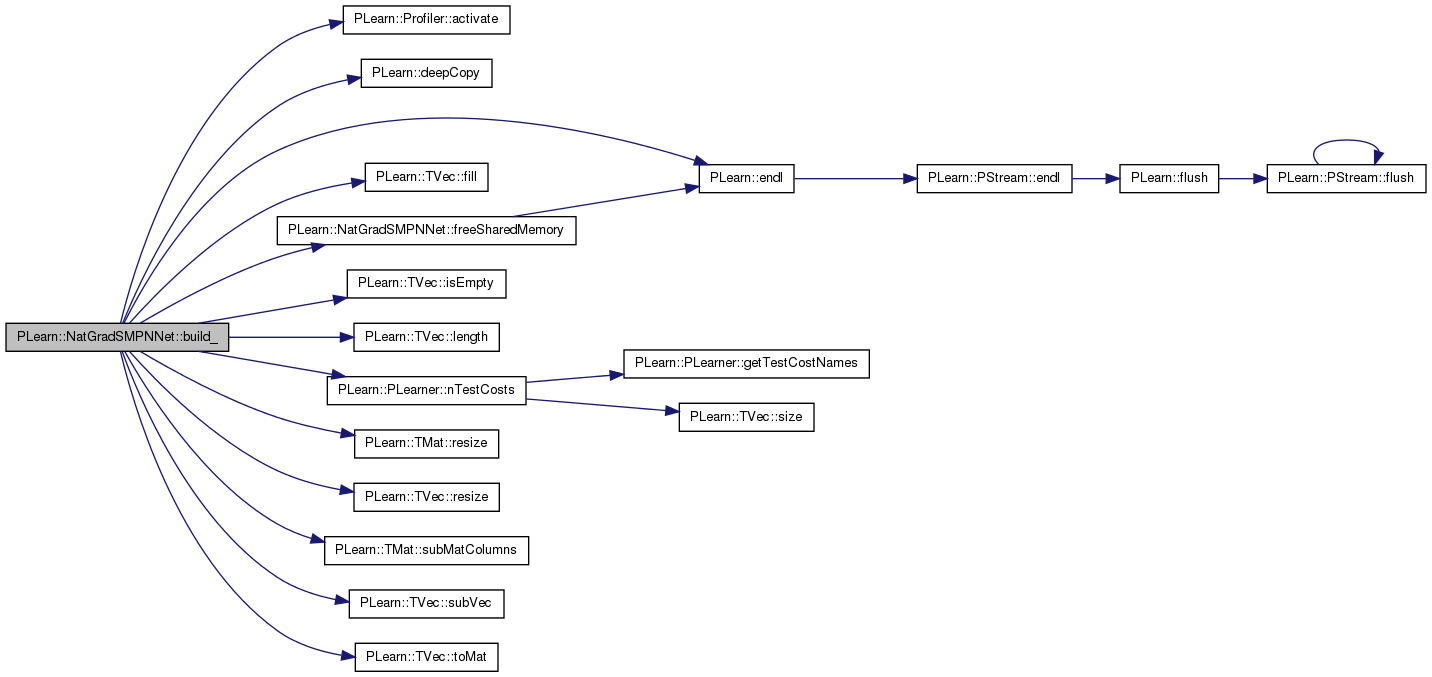

| string PLearn::NatGradSMPNNet::classname | ( | ) | const [virtual] |
Reimplemented from PLearn::Object.
Definition at line 72 of file NatGradSMPNNet.cc.
Referenced by train().

| void PLearn::NatGradSMPNNet::computeCostsFromOutputs | ( | const Vec & | input, |
| const Vec & | output, | ||
| const Vec & | target, | ||
| Vec & | costs | ||
| ) | const [virtual] |
Computes the costs from already computed output.
Implements PLearn::PLearner.
Definition at line 1582 of file NatGradSMPNNet.cc.
References fbpropLoss(), PLearn::TVec< T >::length(), PLearn::TVec< T >::toMat(), and w.
{
Vec w(1);
w[0]=1;
Mat outputM = output.toMat(1,output.length());
Mat targetM = target.toMat(1,output.length());
Mat costsM = costs.toMat(1,costs.length());
fbpropLoss(outputM,targetM,w,costsM);
}

Computes the output from the input.
Reimplemented from PLearn::PLearner.
Definition at line 1411 of file NatGradSMPNNet.cc.
References fpropNet(), n_layers, and neuron_outputs_per_layer.
{
/*
static int out_idx = -1;
out_idx = (out_idx + 1) % 50;
PStream out_log_file = openFile("/u/delallea/tmp/out_log_" +
tostring(out_idx), PStream::raw_ascii, "w");
out_log_file << "Starting to compute output on " << input << endl;
out_log_file.flush();
*/
//Profiler::pl_profile_start("computeOutput");
neuron_outputs_per_layer[0](0) << input;
fpropNet(1,false);
output << neuron_outputs_per_layer[n_layers-1](0);
//Profiler::pl_profile_end("computeOutput");
/*
out_log_file << "Output computed" << endl;
out_log_file.flush();
*/
}
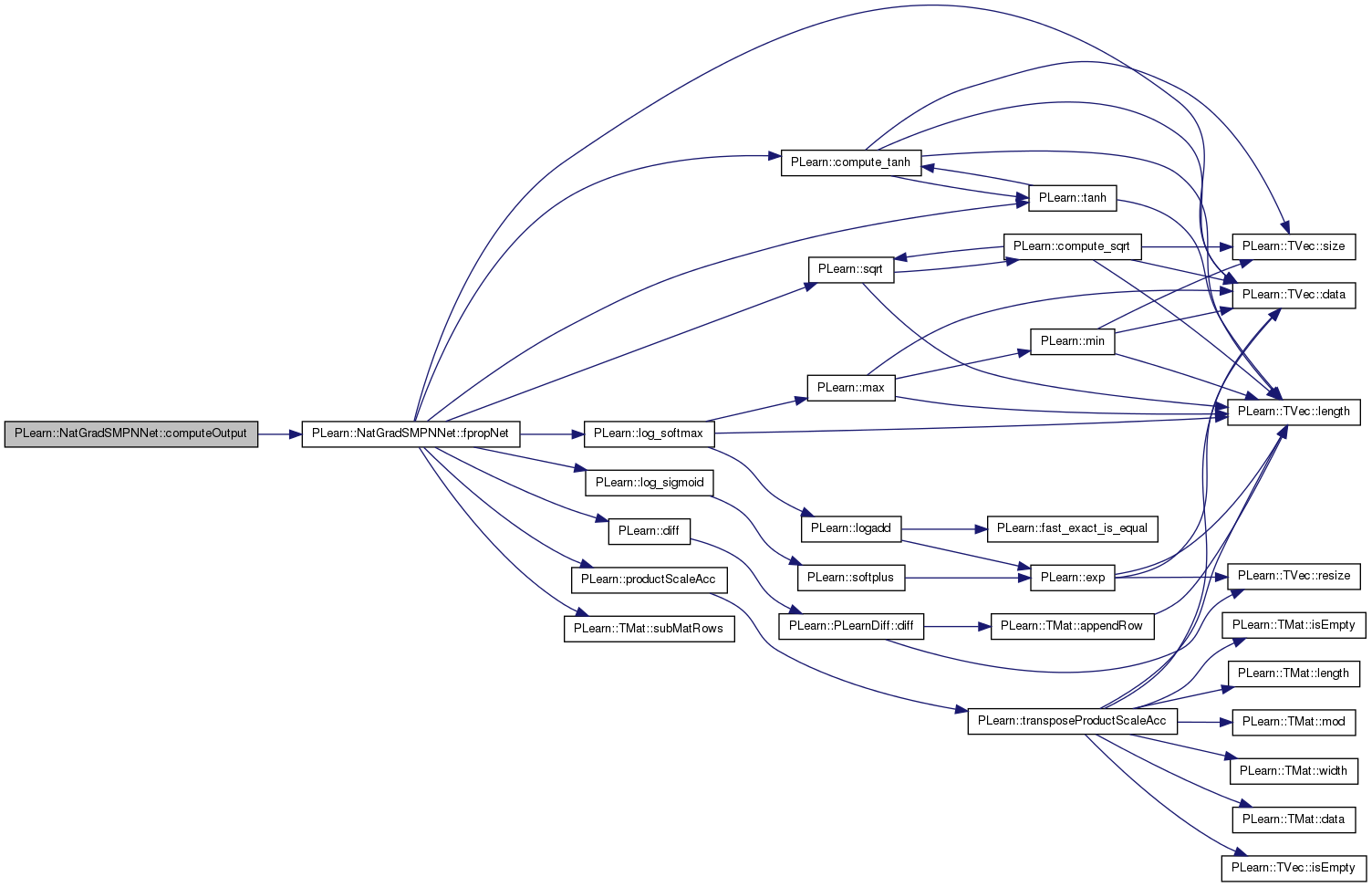
| void PLearn::NatGradSMPNNet::declareMethods | ( | RemoteMethodMap & | rmm | ) | [static, protected] |
Declares the class methods.
Reimplemented from PLearn::PLearner.
Definition at line 374 of file NatGradSMPNNet.cc.
References PLearn::declareMethod(), PLearn::PLearner::declareMethods(), and freeSharedMemory().
{
declareMethod(rmm, "freeSharedMemory", &NatGradSMPNNet::freeSharedMemory,
(BodyDoc("Free shared memory ressources.")));
inherited::declareMethods(rmm);
}
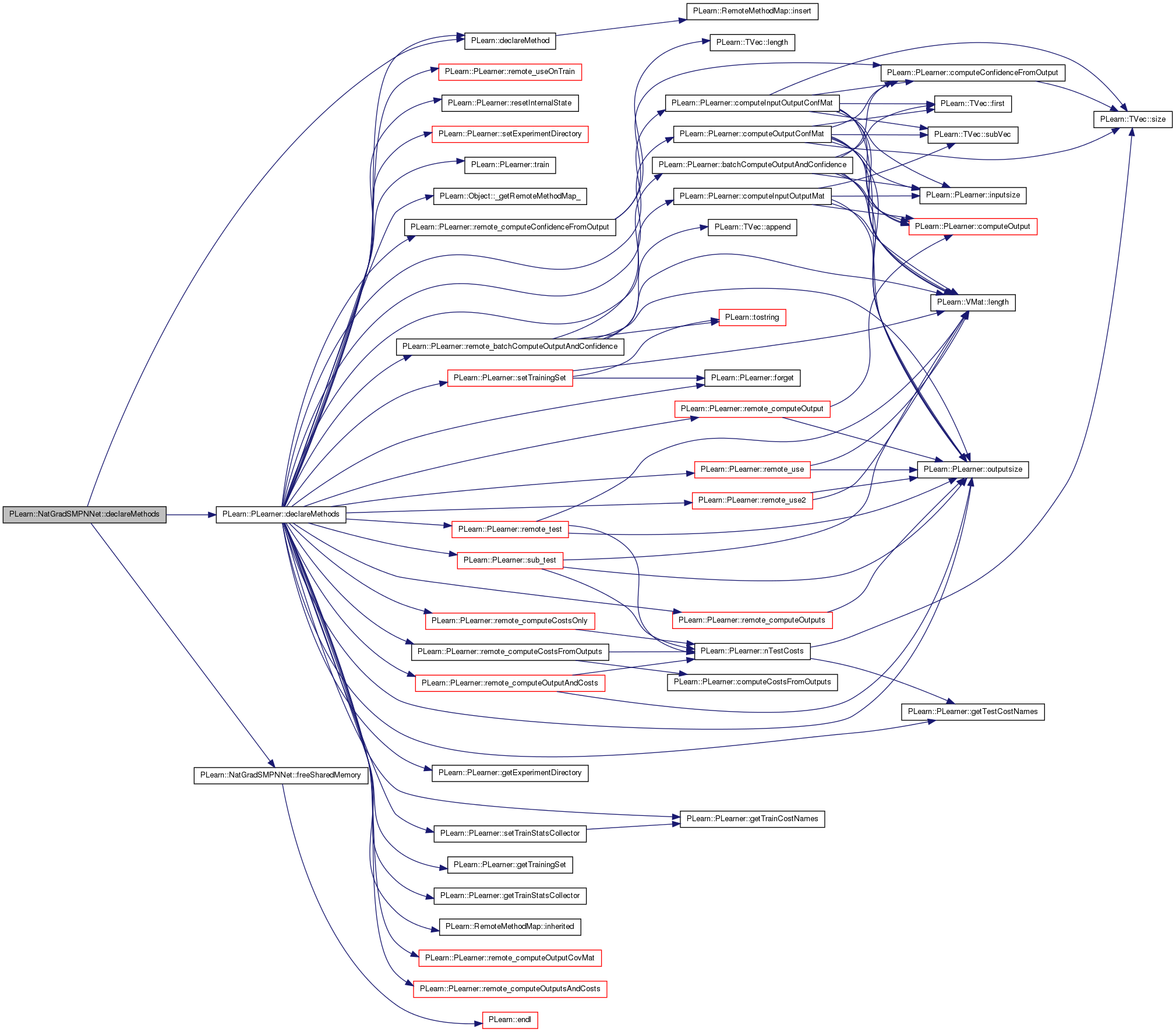
| void PLearn::NatGradSMPNNet::declareOptions | ( | OptionList & | ol | ) | [static, protected] |
Declares the class options.
Reimplemented from PLearn::PLearner.
Definition at line 119 of file NatGradSMPNNet.cc.
References activation_statistics_moving_average_coefficient, activations_scaling, PLearn::OptionBase::buildoption, cumulative_training_time, PLearn::declareOption(), PLearn::PLearner::declareOptions(), delayed_update, full_natgrad, hidden_layer_sizes, init_lrate, input_size_lrate_normalization_power, layer_mparams, layer_params, layer_sizes, PLearn::OptionBase::learntoption, lrate_decay, lrate_scale_factor, lrate_scale_factor_max_power, lrate_scale_factor_min_power, minibatch_size, n_layers, neurons_natgrad_per_layer, neurons_natgrad_template, noutputs, output_layer_L1_penalty_factor, output_layer_lrate_scale, output_type, params_averaging_coeff, params_averaging_freq, params_natgrad_per_group, params_natgrad_per_input_template, params_natgrad_template, pv_acceleration, pv_initial_stepsize, pv_min_samples, pv_random_sample_step, pv_required_confidence, self_adjusted_scaling_and_bias, synchronize_update, target_mean_activation, target_stdev_activation, use_pvgrad, and wait_for_final_update.
{
declareOption(ol, "delayed_update", &NatGradSMPNNet::delayed_update,
OptionBase::buildoption,
"If true, then each CPU's update will be delayed until it is its own\n"
"turn to update. This ensures no two CPUs are modifying parameters\n"
"at the same time.");
declareOption(ol, "wait_for_final_update",
&NatGradSMPNNet::wait_for_final_update,
OptionBase::buildoption,
"If true, each CPU will wait its turn before performing its final\n"
"update. It should impact performance only when 'delayed_update' is\n"
"also true.");
declareOption(ol, "synchronize_update", &NatGradSMPNNet::synchronize_update,
OptionBase::buildoption,
"If true, then processors will in turn update the shared paremeters\n"
"after each mini-batch and will wait until all processors did their\n"
"update before processing the next mini-batch. Otherwise, no\n"
"synchronization is performed and a processor may process multiple\n"
"mini-batches before doing a parameter update.");
declareOption(ol, "noutputs", &NatGradSMPNNet::noutputs,
OptionBase::buildoption,
"Number of outputs of the neural network, which can be derived from output_type and targetsize_\n");
declareOption(ol, "n_layers", &NatGradSMPNNet::n_layers,
OptionBase::learntoption,
"Number of layers of weights (ie. 2 for a neural net with one hidden layer).\n"
"Needs not be specified explicitly (derived from hidden_layer_sizes).\n");
declareOption(ol, "hidden_layer_sizes", &NatGradSMPNNet::hidden_layer_sizes,
OptionBase::buildoption,
"Defines the architecture of the multi-layer neural network by\n"
"specifying the number of hidden units in each hidden layer.\n");
declareOption(ol, "layer_sizes", &NatGradSMPNNet::layer_sizes,
OptionBase::learntoption,
"Derived from hidden_layer_sizes, inputsize_ and noutputs\n");
declareOption(ol, "cumulative_training_time", &NatGradSMPNNet::cumulative_training_time,
OptionBase::learntoption,
"Cumulative training time since age=0, in seconds.\n");
declareOption(ol, "layer_params", &NatGradSMPNNet::layer_params,
OptionBase::learntoption,
"Parameters used while training, for each layer, organized as follows: layer_params[i] \n"
"is a matrix of dimension layer_sizes[i+1] x (layer_sizes[i]+1)\n"
"containing the neuron biases in its first column.\n");
declareOption(ol, "activations_scaling", &NatGradSMPNNet::activations_scaling,
OptionBase::learntoption,
"Scaling coefficients for each neuron of each layer, if self_adjusted_scaling_and_bias:\n"
" output = tanh(activations_scaling[layer][neuron] * (biases[layer][neuron] + weights[layer]*input[layer-1])\n");
declareOption(ol, "layer_mparams", &NatGradSMPNNet::layer_mparams,
OptionBase::learntoption,
"Test parameters for each layer, organized like layer_params.\n"
"This is a moving average of layer_params, computed with\n"
"coefficient params_averaging_coeff. Thus the mparams are\n"
"a smoothed version of the params, and they are used only\n"
"during testing.\n");
declareOption(ol, "params_averaging_coeff", &NatGradSMPNNet::params_averaging_coeff,
OptionBase::buildoption,
"Coefficient used to control how fast we forget old parameters\n"
"in the moving average performed as follows:\n"
"mparams <-- (1-params_averaging_coeff)mparams + params_averaging_coeff*params\n");
declareOption(ol, "params_averaging_freq", &NatGradSMPNNet::params_averaging_freq,
OptionBase::buildoption,
"How often (in terms of number of minibatches, i.e. weight updates)\n"
"do we perform the moving average update calculation\n"
"mparams <-- (1-params_averaging_coeff)mparams + params_averaging_coeff*params\n");
declareOption(ol, "init_lrate", &NatGradSMPNNet::init_lrate,
OptionBase::buildoption,
"Initial learning rate\n");
declareOption(ol, "lrate_decay", &NatGradSMPNNet::lrate_decay,
OptionBase::buildoption,
"Learning rate decay factor\n");
declareOption(ol, "output_layer_L1_penalty_factor",
&NatGradSMPNNet::output_layer_L1_penalty_factor,
OptionBase::buildoption,
"Optional (default=0) factor of L1 regularization term, i.e.\n"
"minimize L1_penalty_factor * sum_{ij} |weights(i,j)| during training.\n"
"Gets multiplied by the learning rate. Only on output layer!!");
declareOption(ol, "output_layer_lrate_scale", &NatGradSMPNNet::output_layer_lrate_scale,
OptionBase::buildoption,
"Scaling factor of the learning rate for the output layer. Values less than 1"
"mean that the output layer parameters have a smaller learning rate than the others.\n");
declareOption(ol, "minibatch_size", &NatGradSMPNNet::minibatch_size,
OptionBase::buildoption,
"Update the parameters only so often (number of examples).\n");
declareOption(ol, "neurons_natgrad_template", &NatGradSMPNNet::neurons_natgrad_template,
OptionBase::buildoption,
"Optional template GradientCorrector for the neurons gradient.\n"
"If not provided, then the natural gradient correction\n"
"on the neurons gradient is not performed.\n");
declareOption(ol, "neurons_natgrad_per_layer",
&NatGradSMPNNet::neurons_natgrad_per_layer,
OptionBase::learntoption,
"Vector of GradientCorrector objects for the gradient on the neurons of each layer.\n"
"They are copies of the neuron_natgrad_template provided by the user.\n");
declareOption(ol, "params_natgrad_template",
&NatGradSMPNNet::params_natgrad_template,
OptionBase::buildoption,
"Optional template GradientCorrector object for the gradient of the parameters inside each neuron\n"
"It is replicated in the params_natgrad vector, for each neuron\n"
"If not provided, then the neuron-specific natural gradient estimator is not used.\n");
declareOption(ol, "params_natgrad_per_input_template",
&NatGradSMPNNet::params_natgrad_per_input_template,
OptionBase::buildoption,
"Optional template GradientCorrector object for the gradient of the parameters of the first layer\n"
"grouped based upon their input. It is replicated in the params_natgrad_per_group vector, for each group.\n"
"If provided, overides the params_natgrad_template for the parameters of the first layer.\n");
declareOption(ol, "params_natgrad_per_group",
&NatGradSMPNNet::params_natgrad_per_group,
OptionBase::learntoption,
"Vector of GradientCorrector objects for the gradient inside groups of parameters.\n"
"They are copies of the params_natgrad_template and params_natgrad_per_input_template\n"
"templates provided by the user.\n");
declareOption(ol, "full_natgrad", &NatGradSMPNNet::full_natgrad,
OptionBase::buildoption,
"GradientCorrector for all the parameter gradients simultaneously.\n"
"This should not be set if neurons_natgrad or params_natgrad_template\n"
"is provided. If none of the GradientCorrectors is provided, then\n"
"regular stochastic gradient is performed.\n");
declareOption(ol, "output_type",
&NatGradSMPNNet::output_type,
OptionBase::buildoption,
"type of output cost: 'cross_entropy' for binary classification,\n"
"'NLL' for classification problems, or 'MSE' for regression.\n");
declareOption(ol, "input_size_lrate_normalization_power",
&NatGradSMPNNet::input_size_lrate_normalization_power,
OptionBase::buildoption,
"Scale the learning rate neuron-wise (or layer-wise actually, here):\n"
"-1 scales by 1 / ||x||^2, where x is the 1-extended input vector of the neuron\n"
"0 does not scale the learning rate\n"
"1 scales it by 1 / the nb of inputs of the neuron\n"
"2 scales it by 1 / sqrt(the nb of inputs of the neuron), etc.\n");
declareOption(ol, "lrate_scale_factor",
&NatGradSMPNNet::lrate_scale_factor,
OptionBase::buildoption,
"scale the learning rate in different neurons by a factor\n"
"taken randomly as follows: choose integer n uniformly between\n"
"lrate_scale_factor_min_power and lrate_scale_factor_max_power\n"
"inclusively, and then scale learning rate by lrate_scale_factor^n.\n");
declareOption(ol, "lrate_scale_factor_max_power",
&NatGradSMPNNet::lrate_scale_factor_max_power,
OptionBase::buildoption,
"See help on lrate_scale_factor\n");
declareOption(ol, "lrate_scale_factor_min_power",
&NatGradSMPNNet::lrate_scale_factor_min_power,
OptionBase::buildoption,
"See help on lrate_scale_factor\n");
declareOption(ol, "self_adjusted_scaling_and_bias",
&NatGradSMPNNet::self_adjusted_scaling_and_bias,
OptionBase::buildoption,
"If true, let each neuron self-adjust its bias and scaling factor\n"
"of its activations so that the mean and standard deviation of the\n"
"activations reach the target_mean_activation and target_stdev_activation.\n"
"The activations mean and variance are estimated by a moving average with\n"
"coefficient given by activations_statistics_moving_average_coefficient\n");
declareOption(ol, "target_mean_activation",
&NatGradSMPNNet::target_mean_activation,
OptionBase::buildoption,
"See help on self_adjusted_scaling_and_bias\n");
declareOption(ol, "target_stdev_activation",
&NatGradSMPNNet::target_stdev_activation,
OptionBase::buildoption,
"See help on self_adjusted_scaling_and_bias\n");
declareOption(ol, "activation_statistics_moving_average_coefficient",
&NatGradSMPNNet::activation_statistics_moving_average_coefficient,
OptionBase::buildoption,
"The activations mean and variance used for self_adjusted_scaling_and_bias\n"
"are estimated by a moving average with this coefficient:\n"
" xbar <-- coefficient * xbar + (1-coefficient) x\n"
"where x could be the activation or its square\n");
//declareOption(ol, "corr_profiling_start",
// &NatGradSMPNNet::corr_profiling_start,
// OptionBase::buildoption,
// "Stage to start the profiling of the gradients' and the\n"
// "natural gradients' correlation.\n");
//declareOption(ol, "corr_profiling_end",
// &NatGradSMPNNet::corr_profiling_end,
// OptionBase::buildoption,
// "Stage to end the profiling of the gradients' and the\n"
// "natural gradients' correlations.\n");
declareOption(ol, "use_pvgrad",
&NatGradSMPNNet::use_pvgrad,
OptionBase::buildoption,
"Use Pascal Vincent's gradient technique.\n"
"All options specific to this technique start with pv_...\n"
"This is currently very experimental. Current code is \n"
"NOT YET optimised for speed (nor supports minibatch).");
declareOption(ol, "pv_initial_stepsize",
&NatGradSMPNNet::pv_initial_stepsize,
OptionBase::buildoption,
"Initial size of steps in parameter space");
declareOption(ol, "pv_acceleration",
&NatGradSMPNNet::pv_acceleration,
OptionBase::buildoption,
"Coefficient by which to multiply/divide the step sizes");
declareOption(ol, "pv_min_samples",
&NatGradSMPNNet::pv_min_samples,
OptionBase::buildoption,
"PV's minimum number of samples to estimate gradient sign.\n"
"This should at least be 2.");
declareOption(ol, "pv_required_confidence",
&NatGradSMPNNet::pv_required_confidence,
OptionBase::buildoption,
"Minimum required confidence (probability of being positive or negative) for taking a step.");
declareOption(ol, "pv_random_sample_step",
&NatGradSMPNNet::pv_random_sample_step,
OptionBase::buildoption,
"If this is set to true, then we will randomly choose the step sign\n"
"for each parameter based on the estimated probability of it being\n"
"positive or negative.");
// Now call the parent class' declareOptions
inherited::declareOptions(ol);
}

| static const PPath& PLearn::NatGradSMPNNet::declaringFile | ( | ) | [inline, static] |
Reimplemented from PLearn::PLearner.
Definition at line 255 of file NatGradSMPNNet.h.
:
//##### Protected Options ###############################################
| NatGradSMPNNet * PLearn::NatGradSMPNNet::deepCopy | ( | CopiesMap & | copies | ) | const [virtual] |
Reimplemented from PLearn::PLearner.
Definition at line 72 of file NatGradSMPNNet.cc.
| void PLearn::NatGradSMPNNet::fbpropLoss | ( | const Mat & | output, |
| const Mat & | target, | ||
| const Vec & | example_weights, | ||
| Mat & | train_costs | ||
| ) | const [protected] |
compute train costs given the network top-layer output and write into neuron_gradients_per_layer[n_layers-2], gradient on pre-non-linearity activation
compute train costs given the (pre-final-non-linearity) network top-layer output
Definition at line 1524 of file NatGradSMPNNet.cc.
References PLearn::argmax(), PLearn::exp(), grad, i, PLearn::TMat< T >::length(), minibatch_size, PLearn::PLearner::n_examples, n_layers, neuron_gradients_per_layer, output_type, pl_log, PLearn::pownorm(), PLearn::TMat< T >::subMatRows(), and PLearn::substract().
Referenced by computeCostsFromOutputs(), and onlineStep().
{
int n_examples = output.length();
Mat out_grad = neuron_gradients_per_layer[n_layers-1];
if (n_examples!=minibatch_size)
out_grad = out_grad.subMatRows(0,n_examples);
if (output_type=="NLL")
{
for (int i=0;i<n_examples;i++)
{
int target_class = int(round(target(i,0)));
Vec outp = output(i);
Vec grad = out_grad(i);
exp(outp,grad); // map log-prob to prob
costs(i,0) = -outp[target_class];
costs(i,1) = (target_class == argmax(outp))?0:1;
grad[target_class]-=1;
if (example_weight[i]!=1.0)
costs(i,0) *= example_weight[i];
}
}
else if(output_type=="cross_entropy") {
for (int i=0;i<n_examples;i++)
{
int target_class = int(round(target(i,0)));
Vec outp = output(i);
Vec grad = out_grad(i);
exp(outp,grad); // map log-prob to prob
if( target_class == 1 ) {
costs(i,0) = - outp[0];
costs(i,1) = (grad[0]>0.5)?0:1;
} else {
costs(i,0) = - pl_log( 1.0 - grad[0] );
costs(i,1) = (grad[0]>0.5)?1:0;
}
grad[0] -= (real)target_class;
if (example_weight[i]!=1.0)
costs(i,0) *= example_weight[i];
}
//cout << "costs\t" << costs(0) << endl;
//cout << "gradient\t" << out_grad(0) << endl;
}
else // if (output_type=="MSE")
{
substract(output,target,out_grad);
for (int i=0;i<n_examples;i++)
{
costs(i,0) = pownorm(out_grad(i));
if (example_weight[i]!=1.0)
{
out_grad(i) *= example_weight[i];
costs(i,0) *= example_weight[i];
}
}
}
}


| void PLearn::NatGradSMPNNet::forget | ( | ) | [virtual] |
(Re-)initializes the PLearner in its fresh state (that state may depend on the 'seed' option) and sets 'stage' back to 0 (this is the stage of a fresh learner!).
(Re-)initialize the PLearner in its fresh state (that state may depend on the 'seed' option) and sets 'stage' back to 0 (this is the stage of a fresh learner!)
Reimplemented from PLearn::PLearner.
Definition at line 689 of file NatGradSMPNNet.cc.
References activations_scaling, all_mparams, all_params, biases, PLearn::TVec< T >::clear(), cumulative_training_time, PLearn::TVec< T >::fill(), PLearn::PLearner::forget(), i, layer_sizes, mean_activations, n, n_layers, nsteps, params_averaging_coeff, params_update, pv_gradstats, pv_initial_stepsize, pv_stepsigns, pv_stepsizes, PLearn::PLearner::random_gen, PLearn::TVec< T >::resize(), PLearn::sqrt(), PLearn::PLearner::stage, use_pvgrad, var_activations, and weights.
{
inherited::forget();
for (int i=0;i<n_layers-1;i++)
{
real delta = 1/sqrt(real(layer_sizes[i]));
random_gen->fill_random_uniform(weights[i],-delta,delta);
biases[i].clear();
activations_scaling[i].fill(1.0);
mean_activations[i].clear();
var_activations[i].fill(1.0);
}
stage = 0;
cumulative_training_time=0;
if (params_averaging_coeff!=1.0)
all_mparams << all_params;
if(use_pvgrad)
{
pv_gradstats->forget();
int n = all_params.length();
pv_stepsizes.resize(n);
pv_stepsizes.fill(pv_initial_stepsize);
pv_stepsigns.resize(n);
pv_stepsigns.fill(true);
}
nsteps = 0;
params_update.fill(0);
}
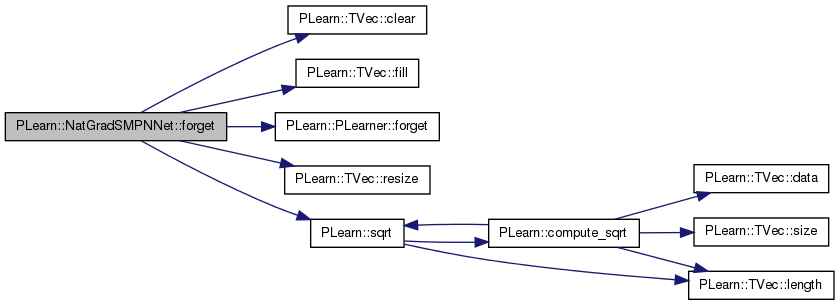
compute a minibatch of size n_examples network top-layer output given layer 0 output (= network input) (note that log-probabilities are computed for classification tasks, output_type=NLL)
compute (pre-final-non-linearity) network top-layer output given input
Definition at line 1433 of file NatGradSMPNNet.cc.
References a, activation_statistics_moving_average_coefficient, activations_scaling, b, biases, PLearn::compute_tanh(), PLearn::TVec< T >::data(), PLearn::diff(), i, j, layer_mparams, layer_params, layer_sizes, PLearn::log_sigmoid(), PLearn::log_softmax(), m, mean_activations, minibatch_size, mweights, PLearn::PLearner::n_examples, n_layers, neuron_extended_outputs_per_layer, neuron_outputs_per_layer, output_type, params_averaging_coeff, params_natgrad_per_input_template, PLASSERT_MSG, PLearn::productScaleAcc(), self_adjusted_scaling_and_bias, PLearn::sqrt(), PLearn::TMat< T >::subMatRows(), PLearn::tanh(), target_mean_activation, target_stdev_activation, var_activations, w, and weights.
Referenced by computeOutput(), and onlineStep().
{
PLASSERT_MSG(n_examples<=minibatch_size,"NatGradSMPNNet::fpropNet: nb input vectors treated should be <= minibatch_size\n");
for (int i=0;i<n_layers-1;i++)
{
Mat prev_layer = (self_adjusted_scaling_and_bias && i+1<n_layers-1)?
neuron_outputs_per_layer[i]:neuron_extended_outputs_per_layer[i];
Mat next_layer = neuron_outputs_per_layer[i+1];
if (n_examples!=minibatch_size)
{
prev_layer = prev_layer.subMatRows(0,n_examples);
next_layer = next_layer.subMatRows(0,n_examples);
}
//alternate
// Are the input weights transposed? (because of ...)
bool tw = true;
if( params_natgrad_per_input_template && i==0 )
tw = false;
// try to use BLAS for the expensive operation
if (self_adjusted_scaling_and_bias && i+1<n_layers-1){
productScaleAcc(next_layer, prev_layer, false,
(during_training || params_averaging_coeff==1.0)?
weights[i]:mweights[i],
tw, 1, 0);
}else{
productScaleAcc(next_layer, prev_layer, false,
(during_training || params_averaging_coeff==1.0)?
layer_params[i]:layer_mparams[i],
tw, 1, 0);
}
// compute layer's output non-linearity
if (i+1<n_layers-1)
for (int k=0;k<n_examples;k++)
{
Vec L=next_layer(k);
if (self_adjusted_scaling_and_bias)
{
real* m=mean_activations[i].data();
real* v=var_activations[i].data();
real* a=L.data();
real* s=activations_scaling[i].data();
real* b=biases[i].data(); // biases[i] is a 1-column matrix
int bmod = biases[i].mod();
for (int j=0;j<layer_sizes[i+1];j++,b+=bmod,m++,v++,a++,s++)
{
if (during_training)
{
real diff = *a - *m;
*v = (1-activation_statistics_moving_average_coefficient) * *v
+ activation_statistics_moving_average_coefficient * diff*diff;
*m = (1-activation_statistics_moving_average_coefficient) * *m
+ activation_statistics_moving_average_coefficient * *a;
*b = target_mean_activation - *m;
if (*v<100*target_stdev_activation*target_stdev_activation)
*s = target_stdev_activation/sqrt(*v);
else // rescale the weights and the statistics for that neuron
{
real rescale_factor = target_stdev_activation/sqrt(*v);
Vec w = weights[i](j);
w *= rescale_factor;
*b *= rescale_factor;
*s = 1;
*m *= rescale_factor;
*v *= rescale_factor*rescale_factor;
}
}
*a = tanh((*a + *b) * *s);
}
}
else{
compute_tanh(L,L);
}
}
else if (output_type=="NLL")
for (int k=0;k<n_examples;k++)
{
Vec L=next_layer(k);
log_softmax(L,L);
}
else if (output_type=="cross_entropy") {
for (int k=0;k<n_examples;k++)
{
Vec L=next_layer(k);
log_sigmoid(L,L);
}
}
}
}
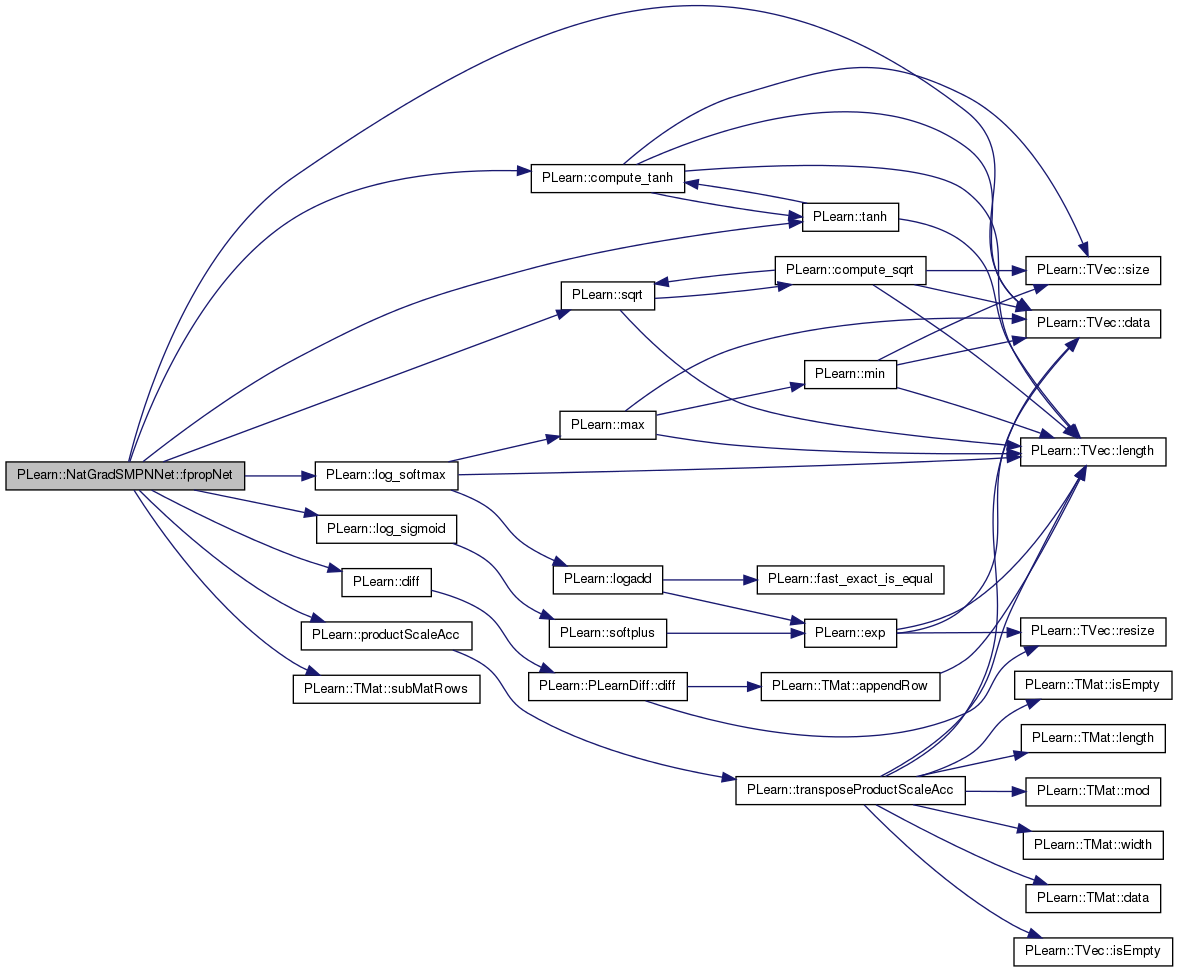

| void PLearn::NatGradSMPNNet::freeSharedMemory | ( | ) | [private] |
Free shared memory that may still be allocated.
Definition at line 609 of file NatGradSMPNNet.cc.
References PLearn::endl(), params_id, params_int_id, params_int_ptr, and params_ptr.
Referenced by build_(), declareMethods(), and ~NatGradSMPNNet().
{
DBG_MODULE_LOG << "Freeing shared memory" << endl;
if (params_ptr) {
shmctl(params_id, IPC_RMID, 0);
params_ptr = NULL;
params_id = -1;
}
if (params_int_ptr) {
shmctl(params_int_id, IPC_RMID, 0);
params_int_ptr = NULL;
params_int_id = -1;
}
}


| OptionList & PLearn::NatGradSMPNNet::getOptionList | ( | ) | const [virtual] |
Reimplemented from PLearn::Object.
Definition at line 72 of file NatGradSMPNNet.cc.
| OptionMap & PLearn::NatGradSMPNNet::getOptionMap | ( | ) | const [virtual] |
Reimplemented from PLearn::Object.
Definition at line 72 of file NatGradSMPNNet.cc.
| RemoteMethodMap & PLearn::NatGradSMPNNet::getRemoteMethodMap | ( | ) | const [virtual] |
Reimplemented from PLearn::Object.
Definition at line 72 of file NatGradSMPNNet.cc.
| TVec< string > PLearn::NatGradSMPNNet::getTestCostNames | ( | ) | const [virtual] |
Returns the names of the costs computed by computeCostsFromOutpus (and thus the test method).
Implements PLearn::PLearner.
Definition at line 1593 of file NatGradSMPNNet.cc.
References output_type, and PLearn::TVec< T >::resize().
Referenced by getTrainCostNames().
{
TVec<string> costs;
if (output_type=="NLL")
{
costs.resize(2);
costs[0]="NLL";
costs[1]="class_error";
}
else if (output_type=="cross_entropy") {
costs.resize(2);
costs[0]="cross_entropy";
costs[1]="class_error";
}
else if (output_type=="MSE")
{
costs.resize(1);
costs[0]="MSE";
}
return costs;
}


| TVec< string > PLearn::NatGradSMPNNet::getTrainCostNames | ( | ) | const [virtual] |
Returns the names of the objective costs that the train method computes and for which it updates the VecStatsCollector train_stats.
Implements PLearn::PLearner.
Definition at line 1615 of file NatGradSMPNNet.cc.
References PLearn::TVec< T >::append(), and getTestCostNames().
{
TVec<string> costs = getTestCostNames();
costs.append("train_seconds");
costs.append("cum_train_seconds");
costs.append("big_loop_seconds_1");
costs.append("big_loop_seconds_2");
return costs;
}

| void PLearn::NatGradSMPNNet::makeDeepCopyFromShallowCopy | ( | CopiesMap & | copies | ) | [virtual] |
Transforms a shallow copy into a deep copy.
Reimplemented from PLearn::PLearner.
Definition at line 628 of file NatGradSMPNNet.cc.
References activations_scaling, all_mparams, all_params, all_params_delta, all_params_gradient, biases, PLearn::deepCopyField(), example_weights, full_natgrad, group_params, group_params_delta, group_params_gradient, hidden_layer_sizes, layer_mparams, layer_params, layer_params_delta, layer_params_gradient, layer_sizes, PLearn::PLearner::makeDeepCopyFromShallowCopy(), mweights, neuron_extended_outputs_per_layer, neuron_gradients, neuron_gradients_per_layer, neuron_outputs_per_layer, neurons_natgrad_per_layer, neurons_natgrad_template, params_int_ptr, params_natgrad_per_group, params_natgrad_per_input_template, params_natgrad_template, params_ptr, PLCHECK_MSG, PLERROR, pv_gradstats, pv_stepsigns, pv_stepsizes, targets, train_costs, and weights.
{
inherited::makeDeepCopyFromShallowCopy(copies);
deepCopyField(hidden_layer_sizes, copies);
deepCopyField(layer_params, copies);
deepCopyField(layer_mparams, copies);
deepCopyField(biases, copies);
deepCopyField(weights, copies);
deepCopyField(mweights, copies);
deepCopyField(activations_scaling, copies);
deepCopyField(neurons_natgrad_template, copies);
deepCopyField(neurons_natgrad_per_layer, copies);
deepCopyField(params_natgrad_template, copies);
deepCopyField(params_natgrad_per_input_template, copies);
deepCopyField(params_natgrad_per_group, copies);
deepCopyField(full_natgrad, copies);
deepCopyField(layer_sizes, copies);
deepCopyField(targets, copies);
deepCopyField(example_weights, copies);
deepCopyField(train_costs, copies);
deepCopyField(neuron_outputs_per_layer, copies);
deepCopyField(neuron_extended_outputs_per_layer, copies);
deepCopyField(all_params, copies);
deepCopyField(all_mparams, copies);
deepCopyField(all_params_gradient, copies);
deepCopyField(layer_params_gradient, copies);
deepCopyField(neuron_gradients, copies);
deepCopyField(neuron_gradients_per_layer, copies);
deepCopyField(all_params_delta, copies);
deepCopyField(group_params, copies);
deepCopyField(group_params_gradient, copies);
deepCopyField(group_params_delta, copies);
deepCopyField(layer_params_delta, copies);
deepCopyField(pv_gradstats, copies);
deepCopyField(pv_stepsizes, copies);
deepCopyField(pv_stepsigns, copies);
PLCHECK_MSG(false, "Not fully implemented");
if (params_ptr)
PLERROR("In NatGradSMPNNet::makeDeepCopyFromShallowCopy - Deep copy of"
" 'params_ptr' not implemented");
if (params_int_ptr)
PLERROR("In NatGradSMPNNet::makeDeepCopyFromShallowCopy - Deep copy of"
" 'params_int_ptr' not implemented");
/*
deepCopyField(, copies);
*/
}

| void PLearn::NatGradSMPNNet::onlineStep | ( | int | t, |
| const Mat & | targets, | ||
| Mat & | train_costs, | ||
| Vec | example_weights | ||
| ) | [protected] |
one minibatch training step
Definition at line 1191 of file NatGradSMPNNet.cc.
References activations_scaling, all_params, all_params_delta, PLearn::TVec< T >::data(), delayed_update, fbpropLoss(), fpropNet(), full_natgrad, g, grad, i, init_lrate, input_size_lrate_normalization_power, j, layer_params, layer_params_delta, layer_params_gradient, layer_params_update, layer_sizes, PLearn::TMat< T >::length(), PLearn::TVec< T >::length(), lrate_decay, minibatch_size, PLearn::multiplyAcc(), n_layers, neuron_extended_outputs_per_layer, neuron_gradients_per_layer, neuron_outputs_per_layer, neurons_natgrad_per_layer, neurons_natgrad_template, output_layer_L1_penalty_factor, output_layer_lrate_scale, params_natgrad_per_group, params_natgrad_per_input_template, params_natgrad_template, PLASSERT, PLERROR, PLearn::pow(), PLearn::productScaleAcc(), pvGradUpdate(), PLearn::TVec< T >::resize(), self_adjusted_scaling_and_bias, PLearn::sqrt(), PLearn::sumsquare(), use_pvgrad, weights, and PLearn::TMat< T >::width().
Referenced by train().
{
// mean gradient over minibatch_size examples has less variance, can afford larger learning rate
// TODO Note that this scaling formula is disabled to avoid confusion about
// what learning rates are being used in experiments.
real lrate = /*sqrt(real(minibatch_size))* */ init_lrate/(1 + cur_stage * lrate_decay);
PLASSERT(targets.length()==minibatch_size && train_costs.length()==minibatch_size && example_weights.length()==minibatch_size);
fpropNet(minibatch_size, true);
fbpropLoss(neuron_outputs_per_layer[n_layers-1],targets,example_weights,train_costs);
for (int i=n_layers-1;i>0;i--)
{
// here neuron_gradients_per_layer[i] contains the gradient on activations (weighted sums)
// (minibatch_size x layer_size[i])
Mat previous_neurons_gradient = neuron_gradients_per_layer[i-1];
Mat next_neurons_gradient = neuron_gradients_per_layer[i];
Mat previous_neurons_output = neuron_outputs_per_layer[i-1];
real layer_lrate_factor = (i==n_layers-1)?output_layer_lrate_scale:1;
if (self_adjusted_scaling_and_bias && i+1<n_layers-1)
for (int k=0;k<minibatch_size;k++)
{
Vec g=next_neurons_gradient(k);
g*=activations_scaling[i-1]; // pass gradient through scaling
}
if (input_size_lrate_normalization_power==-1)
layer_lrate_factor /= sumsquare(neuron_extended_outputs_per_layer[i-1]);
else if (input_size_lrate_normalization_power==-2)
layer_lrate_factor /= sqrt(sumsquare(neuron_extended_outputs_per_layer[i-1]));
else if (input_size_lrate_normalization_power!=0)
{
int fan_in = neuron_extended_outputs_per_layer[i-1].length();
if (input_size_lrate_normalization_power==1)
layer_lrate_factor/=fan_in;
else if (input_size_lrate_normalization_power==2)
layer_lrate_factor/=sqrt(real(fan_in));
else layer_lrate_factor/=pow(fan_in,1.0/input_size_lrate_normalization_power);
}
// optionally correct the gradient on neurons using their covariance
if (neurons_natgrad_template && neurons_natgrad_per_layer[i])
{
static Vec tmp;
tmp.resize(layer_sizes[i]);
for (int k=0;k<minibatch_size;k++)
{
Vec g_k = next_neurons_gradient(k);
PLERROR("Not implemented (t not available)");
//(*neurons_natgrad_per_layer[i])(t-minibatch_size+1+k,g_k,tmp);
g_k << tmp;
}
}
if (i>1) // compute gradient on previous layer
{
// propagate gradients
//Profiler::pl_profile_start("ProducScaleAccOnlineStep");
productScaleAcc(previous_neurons_gradient,next_neurons_gradient,false,
weights[i-1],false,1,0);
//Profiler::pl_profile_end("ProducScaleAccOnlineStep");
// propagate through tanh non-linearity
for (int j=0;j<previous_neurons_gradient.length();j++)
{
real* grad = previous_neurons_gradient[j];
real* out = previous_neurons_output[j];
for (int k=0;k<previous_neurons_gradient.width();k++,out++)
grad[k] *= (1 - *out * *out); // gradient through tanh derivative
}
}
// compute gradient on parameters, possibly update them
if (use_pvgrad)
{
PLERROR("What is this?");
productScaleAcc(layer_params_gradient[i-1],next_neurons_gradient,true,
neuron_extended_outputs_per_layer[i-1],false,1,0);
}
else if (full_natgrad || params_natgrad_template || params_natgrad_per_input_template)
{
//alternate
PLERROR("No, I just want stochastic gradient!");
if( params_natgrad_per_input_template && i==1 ){ // parameters are transposed
productScaleAcc(layer_params_gradient[i-1],
neuron_extended_outputs_per_layer[i-1], true,
next_neurons_gradient, false,
1, 0);
}else{
productScaleAcc(layer_params_gradient[i-1],next_neurons_gradient,true,
neuron_extended_outputs_per_layer[i-1],false,1,0);
}
layer_params_gradient[i-1] *= 1.0/minibatch_size; // use the MEAN gradient
} else {// just regular stochastic gradient
// compute gradient on weights and update them in one go (more efficient)
// mean gradient has less variance, can afford larger learning rate
//Profiler::pl_profile_start("ProducScaleAccOnlineStep");
if (delayed_update) {
// Store updates in 'layer_params_update'.
//layer_params_update[i - 1].fill(0);
productScaleAcc(layer_params_update[i - 1],
next_neurons_gradient, true,
neuron_extended_outputs_per_layer[i-1], false,
-layer_lrate_factor*lrate, 1);
} else {
// Directly update the parameters.
productScaleAcc(layer_params[i-1],next_neurons_gradient,true,
neuron_extended_outputs_per_layer[i-1],false,
-layer_lrate_factor*lrate /* /minibatch_size */, 1);
}
//Profiler::pl_profile_end("ProducScaleAccOnlineStep");
}
}
if (use_pvgrad)
{
PLERROR("What is this?");
pvGradUpdate();
}
else if (full_natgrad)
{
PLERROR("Not implemented (t not available)");
//(*full_natgrad)(t/minibatch_size,all_params_gradient,all_params_delta); // compute update direction by natural gradient
if (output_layer_lrate_scale!=1.0)
layer_params_delta[n_layers-2] *= output_layer_lrate_scale; // scale output layer's learning rate
multiplyAcc(all_params,all_params_delta,-lrate); // update
// Hack to apply batch gradient even in this case (used for profiling
// the gradient correlations)
//if (output_layer_lrate_scale!=1.0)
// layer_params_gradient[n_layers-2] *= output_layer_lrate_scale; // scale output layer's learning rate
// multiplyAcc(all_params,all_params_gradient,-lrate); // update
} else if (params_natgrad_template || params_natgrad_per_input_template)
{
PLERROR("Not implemented (t not available)");
for (int i=0;i<params_natgrad_per_group.length();i++)
{
//GradientCorrector& neuron_natgrad = *(params_natgrad_per_group[i]);
//neuron_natgrad(t/minibatch_size,group_params_gradient[i],group_params_delta[i]); // compute update direction by natural gradient
}
//alternate
if (output_layer_lrate_scale!=1.0)
layer_params_delta[n_layers-2] *= output_layer_lrate_scale; // scale output layer's learning rate
multiplyAcc(all_params,all_params_delta,-lrate); // update
}
// profiling gradient correlation
//if( (t>=corr_profiling_start) && (t<=corr_profiling_end) && g_corrprof ) {
// (*g_corrprof)(all_params_gradient);
// (*ng_corrprof)(all_params_delta);
//}
// Output layer L1 regularization
if( output_layer_L1_penalty_factor != 0. ) {
PLERROR("Not implemented");
real L1_delta = lrate * output_layer_L1_penalty_factor;
real* m_i = layer_params[n_layers-2].data();
for(int i=0; i<layer_params[n_layers-2].length(); i++,m_i+=layer_params[n_layers-2].mod()) {
for(int j=0; j<layer_params[n_layers-2].width(); j++) {
if( m_i[j] > L1_delta )
m_i[j] -= L1_delta;
else if( m_i[j] < -L1_delta )
m_i[j] += L1_delta;
else
m_i[j] = 0.;
}
}
}
}
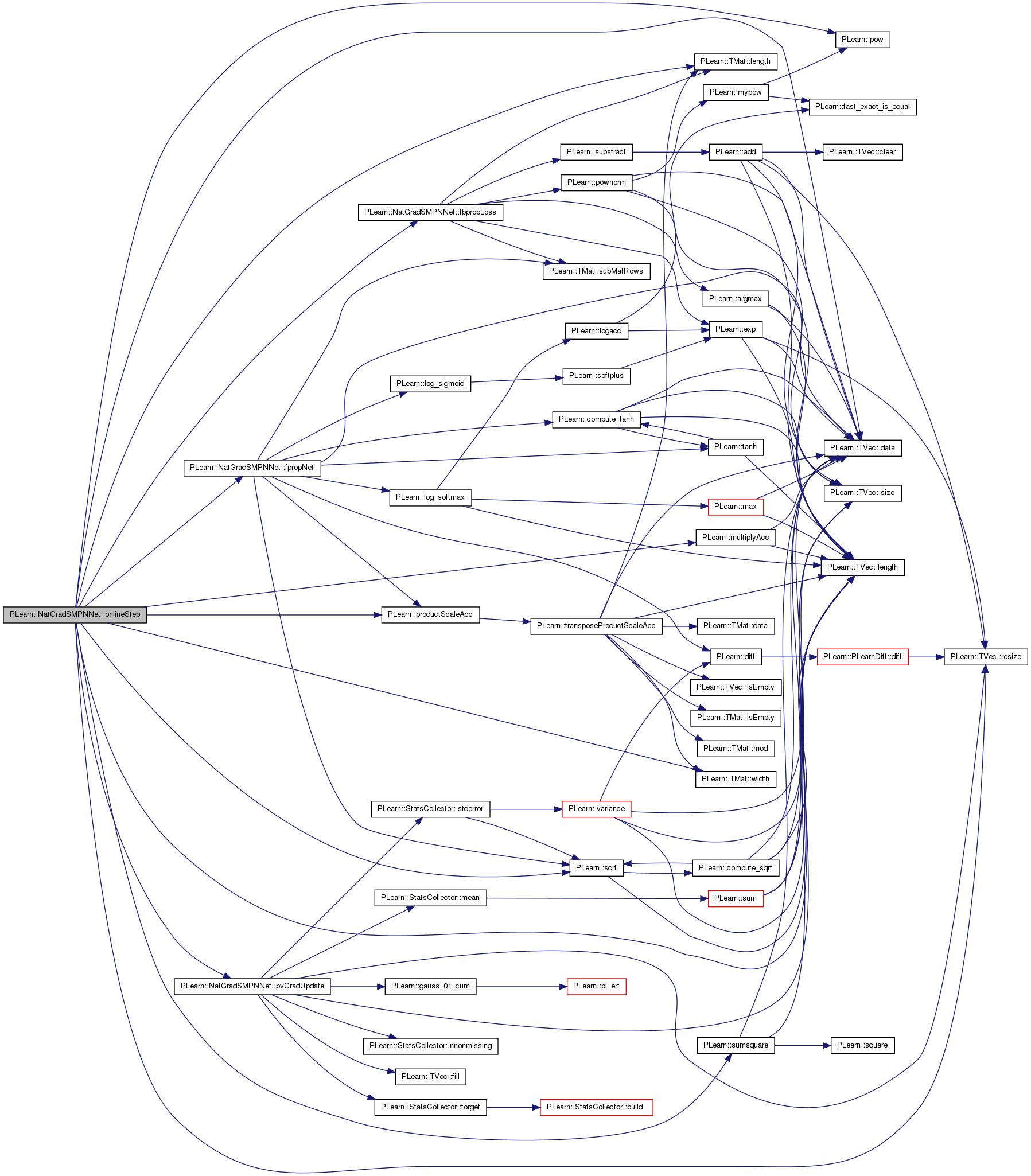

| int PLearn::NatGradSMPNNet::outputsize | ( | ) | const [virtual] |
Returns the size of this learner's output, (which typically may depend on its inputsize(), targetsize() and set options).
Implements PLearn::PLearner.
Definition at line 684 of file NatGradSMPNNet.cc.
References noutputs.
{
return noutputs;
}
| void PLearn::NatGradSMPNNet::pvGradUpdate | ( | ) | [protected] |
gradient computation and weight update in Pascal Vincent's gradient technique
Definition at line 1357 of file NatGradSMPNNet.cc.
References all_params, all_params_gradient, PLearn::TVec< T >::fill(), PLearn::StatsCollector::forget(), PLearn::gauss_01_cum(), PLearn::TVec< T >::length(), m, PLearn::StatsCollector::mean(), n, PLearn::StatsCollector::nnonmissing(), pv_acceleration, pv_gradstats, pv_initial_stepsize, pv_min_samples, pv_random_sample_step, pv_required_confidence, pv_stepsigns, pv_stepsizes, PLearn::PLearner::random_gen, PLearn::TVec< T >::resize(), and PLearn::StatsCollector::stderror().
Referenced by onlineStep().
{
int n = all_params_gradient.length();
if(pv_stepsizes.length()==0)
{
pv_stepsizes.resize(n);
pv_stepsizes.fill(pv_initial_stepsize);
pv_stepsigns.resize(n);
pv_stepsigns.fill(true);
}
pv_gradstats->update(all_params_gradient);
real pv_deceleration = 1.0/pv_acceleration;
for(int k=0; k<n; k++)
{
StatsCollector& st = pv_gradstats->getStats(k);
int n = (int)st.nnonmissing();
if(n>pv_min_samples)
{
real m = st.mean();
real e = st.stderror();
real prob_pos = gauss_01_cum(m/e);
real prob_neg = 1.-prob_pos;
if(!pv_random_sample_step)
{
if(prob_pos>=pv_required_confidence)
{
all_params[k] += pv_stepsizes[k];
pv_stepsizes[k] *= (pv_stepsigns[k]?pv_acceleration:pv_deceleration);
pv_stepsigns[k] = true;
st.forget();
}
else if(prob_neg>=pv_required_confidence)
{
all_params[k] -= pv_stepsizes[k];
pv_stepsizes[k] *= ((!pv_stepsigns[k])?pv_acceleration:pv_deceleration);
pv_stepsigns[k] = false;
st.forget();
}
}
else // random sample update direction (sign)
{
bool ispos = (random_gen->binomial_sample(prob_pos)>0);
if(ispos) // picked positive
all_params[k] += pv_stepsizes[k];
else // picked negative
all_params[k] -= pv_stepsizes[k];
pv_stepsizes[k] *= (pv_stepsigns[k]==ispos) ?pv_acceleration :pv_deceleration;
pv_stepsigns[k] = ispos;
st.forget();
}
}
}
}
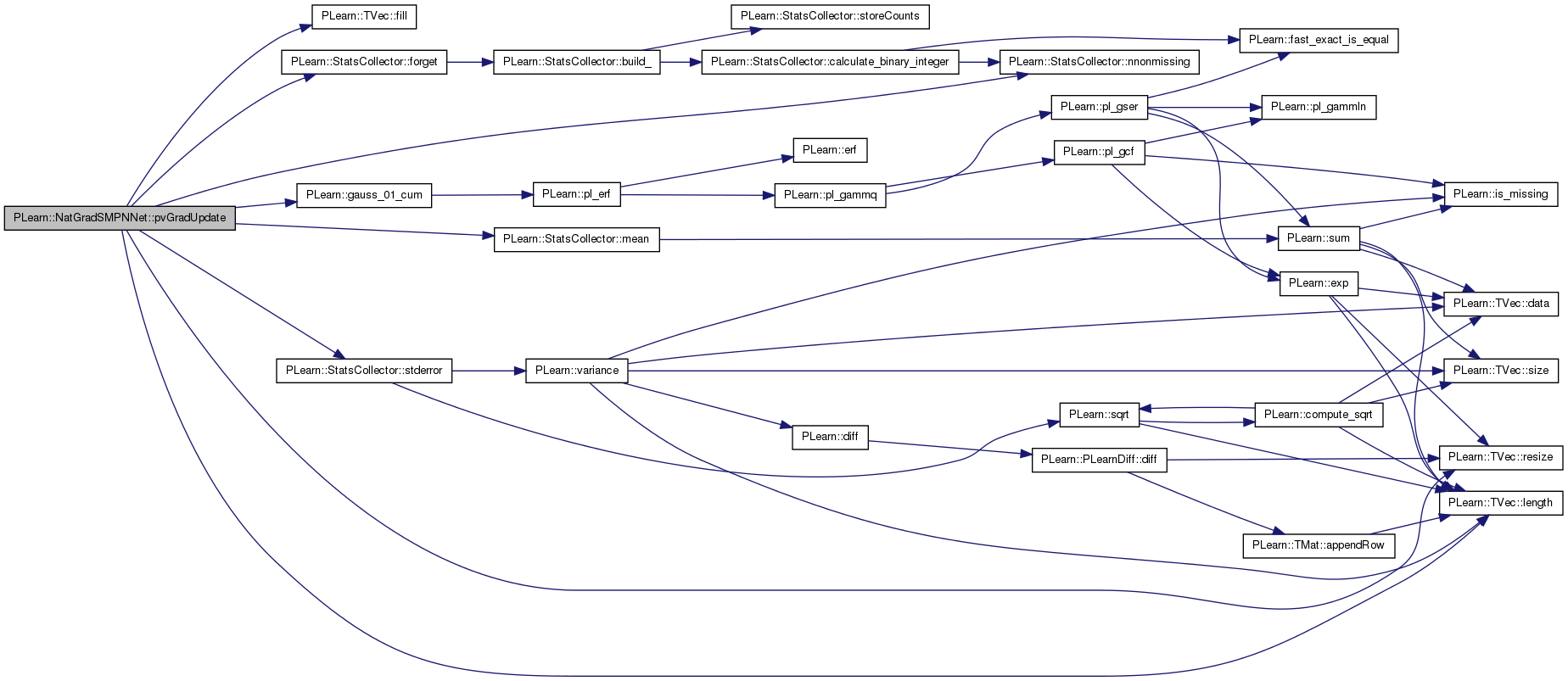

| void PLearn::NatGradSMPNNet::train | ( | ) | [virtual] |
The role of the train method is to bring the learner up to stage==nstages, updating the train_stats collector with training costs measured on-line in the process.
Implements PLearn::PLearner.
Definition at line 726 of file NatGradSMPNNet.cc.
References all_params, b, build(), classname(), PLearn::TVec< T >::clear(), cumulative_training_time, delayed_update, PLearn::Profiler::end(), PLearn::endl(), example_weights, PLearn::TVec< T >::fill(), PLearn::TMat< T >::fill(), PLearn::VMat::getExample(), PLearn::Profiler::getStats(), i, PLearn::PLearner::inputsize_, PLearn::VMat::length(), PLearn::StatsCollector::mean(), minibatch_size, MISSING_VALUE, neuron_outputs_per_layer, PLearn::PLearner::nstages, nsteps, PLearn::PLearner::nTrainCosts(), onlineStep(), params_int_ptr, params_update, PLASSERT, PLASSERT_MSG, PLCHECK, PLERROR, PLWARNING, PLearn::pout, PLearn::StatsCollector::pseudo_quantile(), PLearn::PLearner::report_progress, PLearn::Profiler::reset(), PLearn::TMat< T >::resize(), PLearn::sample(), semaphore_id, PLearn::PLearner::setTrainStatsCollector(), PLearn::PLearner::stage, PLearn::Profiler::start(), PLearn::StatsCollector::stderror(), PLearn::TVec< T >::subVec(), synchronize_update, PLearn::Profiler::Stats::system_duration, targets, PLearn::PLearner::targetsize(), PLearn::Profiler::ticksPerSecond(), train_costs, PLearn::PLearner::train_set, PLearn::PLearner::train_stats, PLearn::StatsCollector::update(), PLearn::Profiler::Stats::user_duration, wait_for_final_update, and PLearn::TMat< T >::width().
{
static int log_idx = -1;
log_idx = (log_idx + 1) % 50;
/*
PStream tmp_log = openFile("/u/delallea/tmp/tmp_log" + tostring(log_idx),
PStream::raw_ascii, "w");
tmp_log << "Starting train " << endl;
tmp_log.flush();
*/
if (inputsize_<0) {
/*
tmp_log << "Calling build" << endl;
tmp_log.flush();
*/
build();
}
targets.resize(minibatch_size,targetsize()); // the train_set's targetsize()
if(!train_set)
PLERROR("In NNet::train, you did not setTrainingSet");
if(!train_stats)
setTrainStatsCollector(new VecStatsCollector());
train_costs.fill(MISSING_VALUE) ;
train_stats->forget();
PP<ProgressBar> pb;
//tmp_log << "Beginning stuff done" << endl;
//tmp_log.flush();
Profiler::reset("training");
Profiler::start("training");
//Profiler::pl_profile_start("Totaltraining");
if( report_progress && stage < nstages )
pb = new ProgressBar( "Training "+classname(),
nstages - stage );
Vec costs_plus_time(nTrainCosts(), MISSING_VALUE);
Vec costs = costs_plus_time.subVec(0, train_costs.width());
int nsamples = train_set->length();
// Obtain the number of CPUs we want to use.
char* ncpus_ptr = getenv("NCPUS");
if (!ncpus_ptr)
PLERROR("In NatGradSMPNNet::train - The environment variable 'NCPUS' "
"must be set (to the number of CPUs being used)");
int ncpus = atoi(ncpus_ptr);
// Semaphore to know which cpu should be updating weights next.
if (semaphore_id >= 0) {
// First get rid of existing semaphore.
int success = semctl(semaphore_id, 0, IPC_RMID);
if (success < 0)
PLERROR("In NatGradSMPNNet::train - Could not remove previous "
"semaphore (errno = %d)", errno);
semaphore_id = -1;
}
// The semaphore has 'ncpus' + 2 values.
// The first one is the index of the CPU that will be next to update
// weights.
// The other ones are 0/1 values that are initialized with 0, and take 1
// once the corresponding CPU has finished all updates for this training
// period.
// Finally, the last value is 0 when 'synchronize_update' is false, and
// otherwise is:
// - in a first step, the number of CPUs that have finished performing
// their mini-batch computation,
// - in a second step, the number of CPUs that have finished updating the
// shared parameters.
semaphore_id = semget(IPC_PRIVATE, ncpus + 2, 0666 | IPC_CREAT);
if (semaphore_id == -1)
PLERROR("In NatGradSMPNNet::train - Could not create semaphore "
"(errno = %d)", errno);
// Initialize all values in the semaphore to zero.
semun semun_v;
semun_v.val = 0;
for (int i = 0; i < ncpus + 2; i++) {
int success = semctl(semaphore_id, i, SETVAL, semun_v);
if (success != 0)
PLERROR("In NatGradSMPNNet::train - Could not initialize semaphore"
" value (errno = %d)", errno);
}
// Initialize current stage, stored in integer shared memory.
int stage_idx = 0;
params_int_ptr[stage_idx] = stage;
//tmp_log << "Ready to fork" << endl;
//tmp_log.flush();
// No need to call wait() to acknowledge the death of a child process in
// order to avoid defunct processes.
signal(SIGCLD, SIG_IGN);
// Fork one process/cpu.
int iam = 0;
for (int cpu = 1; cpu < ncpus ; cpu++)
if (fork() == 0) {
iam = cpu;
break;
}
if (!iam) {
//tmp_log << "Forked" << endl;
//tmp_log.flush();
}
// Each processor computes gradient over its own subset of samples (between
// indices 'start' and 'start + my_n_samples' in the training set).
int n_left = nsamples % ncpus;
int n_per_cpu = nsamples / ncpus;
int start, my_n_samples;
if (iam < n_left) {
// This CPU is given one extra training sample to compensate for the
// fact that the number of samples is not an exact multiple of the
// number of CPUs.
start = (n_per_cpu + 1) * iam;
my_n_samples = n_per_cpu + 1;
} else {
start = (n_per_cpu + 1) * n_left + n_per_cpu * (iam - n_left);
my_n_samples = n_per_cpu;
}
if (iam == 0)
PLASSERT_MSG( start == 0, "First CPU must start at first sample" );
if (iam == ncpus - 1)
PLASSERT_MSG( start + my_n_samples == nsamples,
"Last CPU must start at last sample" );
// The total number of examples that must be seen is given by 'stage_incr',
// computed as 'nstages - stage'. Each CPU is responsible for going through
// a fraction of 'stage_incr', denoted by 'my_stage_incr'.
int stage_incr = nstages - stage;
int stage_incr_per_cpu = stage_incr / ncpus;
int stage_incr_left = stage_incr % ncpus;
int my_stage_incr = iam >= stage_incr_left ? stage_incr_per_cpu
: stage_incr_per_cpu + 1;
PP<PTimer> ptimer;
// Number of mini-batches that have been processed before one update.
int n_minibatches_per_update = 0;
StatsCollector nmbpu_stats; // Use -1 in constructor if you want the median.
if (iam == 0) {
//tmp_log << "Starting loop" << endl;
//tmp_log.flush();
ptimer = new PTimer();
Profiler::reset("big_loop");
Profiler::start("big_loop");
ptimer->startTimer("big_loop");
}
// TODO Maybe...
// - see if it has anything to do with accessing shared memory
// - try to mix in data with a lower or higher measure_every, just to see
// if the difference in behaviors in speedup_whilefalse is due to having
// less examples to process.
//pout << "CPU " << iam << ": my_stage_incr = " << my_stage_incr << endl;
for(int i = 0; i < my_stage_incr; i++)
{
int sample = start + i % my_n_samples;
int b = i % minibatch_size;
Vec input = neuron_outputs_per_layer[0](b);
Vec target = targets(b);
//Profiler::pl_profile_start("getting_data");
train_set->getExample(sample, input, target, example_weights[b]);
//Profiler::pl_profile_end("getting_data");
if (b == minibatch_size - 1 || i == my_stage_incr - 1 )
{
// Read the current stage value (will be used to compute the
// current learning rate).
int cur_stage = params_int_ptr[stage_idx];
PLASSERT( cur_stage >= 0 );
// Note that we should actually call onlineStep only on the subset
// of samples that are new (compared to the previous mini-batch).
// This is left as a TODO since it is not a priority.
/*
string samples_str = tostring(samples);
printf("CPU %d computing (cur_stage = %d) on samples: %s\n",
iam, cur_stage, samples_str.c_str());
*/
onlineStep(cur_stage, targets, train_costs, example_weights );
n_minibatches_per_update++;
/*
pout << "CPU " << iam << ": n_minibatches_per_update = "
<< n_minibatches_per_update << endl;
*/
/*
sleep(iam);
string update = tostring(params_update);
printf("\nCPU %d's current update: %s\n", iam, update.c_str());
*/
nsteps += b + 1;
/*
for (int i=0;i<minibatch_size;i++)
{
costs << train_costs(b);
train_stats->update( costs_plus_time );
}
*/
// Update weights if it is this cpu's turn.
bool performed_update = false; // True when this CPU has updated.
while (true) {
int sem_value = semctl(semaphore_id, 0, GETVAL);
if (sem_value == iam) {
int n_ready = 0;
if (synchronize_update && !performed_update) {
// We first indicate that this CPU is ready to perform his
// update.
n_ready = semctl(semaphore_id, ncpus + 1, GETVAL);
n_ready++;
semun_v.val = n_ready;
int success = semctl(semaphore_id, ncpus + 1, SETVAL,
semun_v);
PLCHECK( success == 0 );
}
if (delayed_update && (!synchronize_update ||
(!performed_update && n_ready > ncpus)))
{
// Once all CPUs are ready we can actually perform the
// updates.
//printf("CPU %d updating (nsteps = %d)\n", iam, nsteps);
all_params += params_update;
//params_update += all_params;
params_update.clear();
nmbpu_stats.update(real(n_minibatches_per_update));
n_minibatches_per_update = 0;
performed_update = true;
}
if (nsteps > 0) {
// Update the current stage.
cur_stage = params_int_ptr[stage_idx];
PLASSERT( cur_stage >= 0 );
int new_stage = cur_stage + nsteps;
params_int_ptr[stage_idx] = new_stage;
nsteps = 0;
}
if (n_ready == 2 * ncpus) {
// The last CPU has updated the parameters. All CPUs can
// now break out of this loop.
n_ready = semun_v.val = 0;
int success = semctl(semaphore_id, ncpus + 1, SETVAL,
semun_v);
PLCHECK( success == 0 );
}
// Give update token to next CPU.
sem_value = (sem_value + 1) % ncpus;
semun_v.val = sem_value;
int success = semctl(semaphore_id, 0, SETVAL, semun_v);
if (success != 0)
PLERROR("In NatGradSMPNNet::train - Could not update "
"semaphore with next CPU (errno = %d, returned "
"value = %d, set value = %d)", errno, success,
semun_v.val);
if (!delayed_update || n_ready == 0)
// If 'synchronize_update' is false this is always true.
// If 'synchronize_update' is true this means all CPUs have
// updated the parameters.
break;
} else {
if (!synchronize_update)
// We do not wait our turn: instead we move on to the next
// minibatch.
break;
if (performed_update) {
// TODO We could break here by checking the 'n_ready'
// semaphore: once it is reset to zero everyone can exit at
// once without necessarily doing it in turn.
}
}
}
}
/*
if (params_averaging_coeff!=1.0 &&
b==minibatch_size-1 &&
(stage+1)%(minibatch_size*params_averaging_freq)==0)
{
PLERROR("Not implemented for SMP");
multiplyScaledAdd(all_params, 1-params_averaging_coeff,
params_averaging_coeff, all_mparams);
}
if( pb ) {
PLERROR("Progress bar not implemented for SMP");
pb->update( stage + 1 );
}
*/
}
if (iam == 0) {
//tmp_log << "Loop ended" << endl;
//tmp_log.flush();
Profiler::end("big_loop");
ptimer->stopTimer("big_loop");
}
if (!wait_for_final_update) {
if (nsteps > 0) {
//printf("CPU %d final updating (nsteps =%d)\n", iam, nsteps);
if (delayed_update) {
all_params += params_update;
params_update.clear();
}
// Note that the line below is not safe: if two CPUs are running it
// at the same time, the number of stages may not be correct.
params_int_ptr[stage_idx] += nsteps;
nsteps = 0;
}
// Indicate this CPU is done.
semun_v.val = 1;
semctl(semaphore_id, iam + 1, SETVAL, semun_v);
if (iam != 0) {
// Exit additional processes after training.
//printf("CPU %d exiting\n", iam);
exit(0);
}
}
//Profiler::reset("Synchronization");
//Profiler::start("Synchronization");
//tmp_log << "Synchronization" << endl;
//tmp_log.flush();
// Wait until it is our turn.
bool displayed_stats = true;
while (true) {
int sem_value = semctl(semaphore_id, 0, GETVAL);
if (sem_value == iam || iam == 0) {
if (sem_value == iam && wait_for_final_update) {
// Display statistics for effective sizes of mini-batches.
if (!displayed_stats) {
pout << "CPU " << iam << ": " << endl
<< " - mean : " << nmbpu_stats.mean() << endl
<< " - stderr: " << nmbpu_stats.stderror() << endl
<< " - median: " << nmbpu_stats.pseudo_quantile(0.5) << endl;
displayed_stats = true;
}
if (nsteps > 0) {
//printf("CPU %d final updating (nsteps =%d)\n", iam, nsteps);
if (delayed_update) {
all_params += params_update;
params_update.clear();
}
params_int_ptr[stage_idx] += nsteps;
nsteps = 0;
}
// Indicate this CPU is done.
semun_v.val = 1;
semctl(semaphore_id, iam + 1, SETVAL, semun_v);
if (iam != 0) {
// Exit additional processes after training.
//printf("CPU %d exiting\n", iam);
exit(0);
}
}
PLASSERT( iam == 0 );
if (semctl(semaphore_id, sem_value + 1, GETVAL) == 0) {
// The next process is not done yet: we need to wait.
#if 0
printf("Main CPU (%d) still waiting on CPU %d\n", iam,
sem_value);
#endif
continue;
}
// Check if all CPUs are done.
bool finished = true;
for (int i = 0; i < ncpus; i++) {
if (semctl(semaphore_id, i + 1, GETVAL) == 0) {
/*
printf("Main CPU still waiting on CPU %d (GETVAL => %d)\n",
i, semctl(semaphore_id, i + 1, GETVAL));
*/
finished = false;
break;
}
}
if (finished) {
//printf("Main CPU ready to finish (all ready!)\n");
break;
}
// Next CPU!
sem_value = (sem_value + 1) % ncpus;
semun_v.val = sem_value;
semctl(semaphore_id, 0, SETVAL, semun_v);
}
}
//tmp_log << "Synchronized" << endl;
//tmp_log.flush();
//Profiler::end("Synchronization");
/*
const Profiler::Stats& synch_stats = Profiler::getStats("Synchronization");
real synch_time = (synch_stats.user_duration + synch_stats.system_duration)
/ real(Profiler::ticksPerSecond());
DBG_MODULE_LOG << "Synch time: " << synch_time << endl;
*/
// Get current stage (for debug purpose).
int cur_stage = params_int_ptr[stage_idx];
PLASSERT( cur_stage >= 0 );
// Free semaphore's ressources.
if (semaphore_id >= 0) {
int success = semctl(semaphore_id, 0, IPC_RMID);
if (success < 0)
PLERROR("In NatGradSMPNNet::train - Could not remove previous "
"semaphore (errno = %d)", errno);
semaphore_id = -1;
}
//tmp_log << "Finishing stuff" << endl;
//tmp_log.flush();
// Update the learner's stage.
stage = nstages;
if (stage != cur_stage)
PLWARNING("The target stage (%d) was not reached exactly (actual "
"stage: %d)", stage, cur_stage);
Profiler::end("training");
//Profiler::pl_profile_end("Totaltraining");
/*
if (verbosity>0)
Profiler::report(cout);
*/
const Profiler::Stats& stats = Profiler::getStats("training");
const Profiler::Stats& big_loop_stats = Profiler::getStats("big_loop");
costs.fill(MISSING_VALUE);
real ticksPerSec = Profiler::ticksPerSecond();
real cpu_time = (stats.user_duration+stats.system_duration)/ticksPerSec;
cumulative_training_time += cpu_time;
costs_plus_time[train_costs.width()] = cpu_time;
costs_plus_time[train_costs.width()+1] = cumulative_training_time;
costs_plus_time[train_costs.width()+2] =
(big_loop_stats.user_duration + big_loop_stats.system_duration) /
ticksPerSec;
costs_plus_time[train_costs.width() + 3] = ptimer->getTimer("big_loop");
train_stats->update( costs_plus_time );
train_stats->finalize(); // finalize statistics for this epoch
//tmp_log << "Done!" << endl;
//tmp_log.flush();
// profiling gradient correlation
//if( g_corrprof ) {
// PLASSERT( corr_profiling_end <= nstages );
// g_corrprof->printAndReset();
// ng_corrprof->printAndReset();
//}
}
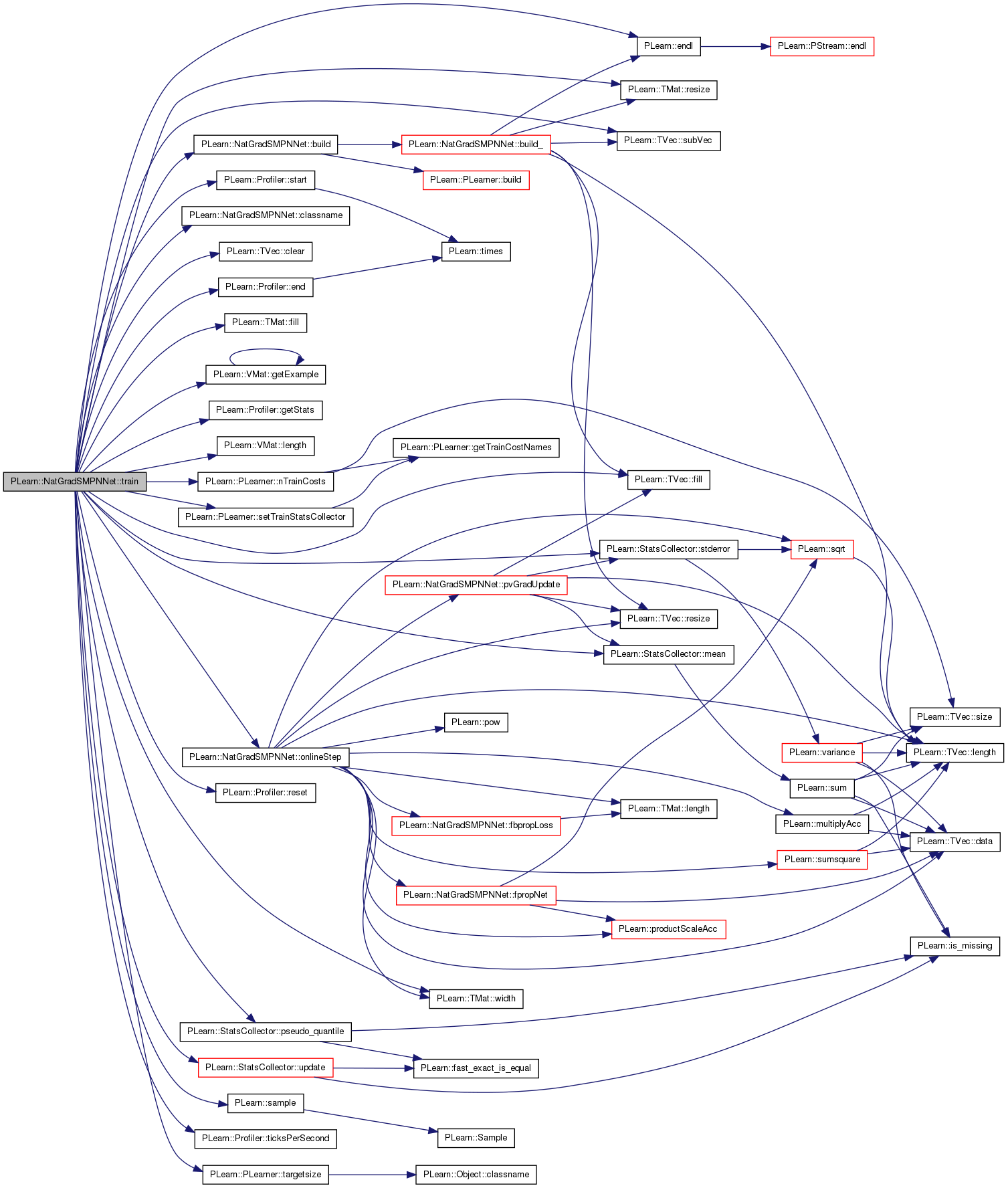
Reimplemented from PLearn::PLearner.
Definition at line 255 of file NatGradSMPNNet.h.
Definition at line 145 of file NatGradSMPNNet.h.
Referenced by declareOptions(), and fpropNet().
TVec<Vec> PLearn::NatGradSMPNNet::activations_scaling [protected] |
Definition at line 278 of file NatGradSMPNNet.h.
Referenced by build_(), declareOptions(), forget(), fpropNet(), makeDeepCopyFromShallowCopy(), and onlineStep().
Vec PLearn::NatGradSMPNNet::all_mparams [private] |
Definition at line 321 of file NatGradSMPNNet.h.
Referenced by build_(), forget(), and makeDeepCopyFromShallowCopy().
Vec PLearn::NatGradSMPNNet::all_params [private] |
Definition at line 318 of file NatGradSMPNNet.h.
Referenced by build_(), forget(), makeDeepCopyFromShallowCopy(), onlineStep(), pvGradUpdate(), and train().
Vec PLearn::NatGradSMPNNet::all_params_delta [private] |
Definition at line 319 of file NatGradSMPNNet.h.
Referenced by build_(), makeDeepCopyFromShallowCopy(), and onlineStep().
Definition at line 320 of file NatGradSMPNNet.h.
Referenced by build_(), makeDeepCopyFromShallowCopy(), and pvGradUpdate().
TVec<Mat> PLearn::NatGradSMPNNet::biases [protected] |
pointers into the layer_params
Definition at line 276 of file NatGradSMPNNet.h.
Referenced by build_(), forget(), fpropNet(), and makeDeepCopyFromShallowCopy().
real PLearn::NatGradSMPNNet::cumulative_training_time [protected] |
Definition at line 281 of file NatGradSMPNNet.h.
Referenced by declareOptions(), forget(), and train().
Definition at line 60 of file NatGradSMPNNet.h.
Referenced by build_(), declareOptions(), onlineStep(), and train().
Vec PLearn::NatGradSMPNNet::example_weights [private] |
Definition at line 332 of file NatGradSMPNNet.h.
Referenced by build_(), makeDeepCopyFromShallowCopy(), and train().
optionally, if neurons_natgrad==0 and params_natgrad_template==0, one can have regular stochastic gradient descent, or full-covariance natural gradient using the natural gradient estimator below
Definition at line 118 of file NatGradSMPNNet.h.
Referenced by declareOptions(), makeDeepCopyFromShallowCopy(), and onlineStep().
TVec<Vec> PLearn::NatGradSMPNNet::group_params [private] |
Definition at line 324 of file NatGradSMPNNet.h.
Referenced by build_(), and makeDeepCopyFromShallowCopy().
TVec<Vec> PLearn::NatGradSMPNNet::group_params_delta [private] |
Definition at line 325 of file NatGradSMPNNet.h.
Referenced by build_(), and makeDeepCopyFromShallowCopy().
TVec<Vec> PLearn::NatGradSMPNNet::group_params_gradient [private] |
Definition at line 326 of file NatGradSMPNNet.h.
Referenced by build_(), and makeDeepCopyFromShallowCopy().
sizes of hidden layers, provided by the user.
Definition at line 67 of file NatGradSMPNNet.h.
Referenced by build_(), declareOptions(), and makeDeepCopyFromShallowCopy().
initial learning rate
Definition at line 81 of file NatGradSMPNNet.h.
Referenced by declareOptions(), and onlineStep().
0 does not scale the learning rate 1 scales it by 1 / the nb of inputs of the neuron 2 scales it by 1 / sqrt(the nb of inputs of the neuron) etc.
Definition at line 127 of file NatGradSMPNNet.h.
Referenced by declareOptions(), and onlineStep().
mean layer_params, averaged over past updates (moving average)
Definition at line 73 of file NatGradSMPNNet.h.
Referenced by build_(), declareOptions(), fpropNet(), and makeDeepCopyFromShallowCopy().
layer_params[i] is a matrix of dimension layer_sizes[i+1] x (layer_sizes[i]+1) containing the neuron biases in its first column.
Definition at line 71 of file NatGradSMPNNet.h.
Referenced by build_(), declareOptions(), fpropNet(), makeDeepCopyFromShallowCopy(), and onlineStep().
TVec<Vec> PLearn::NatGradSMPNNet::layer_params_delta [private] |
Definition at line 323 of file NatGradSMPNNet.h.
Referenced by build_(), makeDeepCopyFromShallowCopy(), and onlineStep().
TVec<Mat> PLearn::NatGradSMPNNet::layer_params_gradient [private] |
Definition at line 322 of file NatGradSMPNNet.h.
Referenced by build_(), makeDeepCopyFromShallowCopy(), and onlineStep().
TVec<Mat> PLearn::NatGradSMPNNet::layer_params_update [private] |
Used to store updates to the parameters of each layer (points into the 'params_update' vector).
Definition at line 355 of file NatGradSMPNNet.h.
Referenced by build_(), and onlineStep().
TVec<int> PLearn::NatGradSMPNNet::layer_sizes [protected] |
layer sizes (derived from hidden_layer_sizes, inputsize_ and outputsize_)
Definition at line 273 of file NatGradSMPNNet.h.
Referenced by build_(), declareOptions(), forget(), fpropNet(), makeDeepCopyFromShallowCopy(), and onlineStep().
learning rate decay factor
Definition at line 84 of file NatGradSMPNNet.h.
Referenced by declareOptions(), and onlineStep().
scale the learning rate in different neurons by a factor taken randomly as follows: choose integer n uniformly between lrate_scale_factor_min_power and lrate_scale_factor_max_power inclusively, and then scale learning rate by lrate_scale_factor^n.
Definition at line 133 of file NatGradSMPNNet.h.
Referenced by declareOptions().
Definition at line 134 of file NatGradSMPNNet.h.
Referenced by declareOptions().
Definition at line 135 of file NatGradSMPNNet.h.
Referenced by declareOptions().
TVec<Vec> PLearn::NatGradSMPNNet::mean_activations [protected] |
Definition at line 279 of file NatGradSMPNNet.h.
Referenced by build_(), forget(), and fpropNet().
update the parameters only so often
Definition at line 93 of file NatGradSMPNNet.h.
Referenced by build_(), declareOptions(), fbpropLoss(), fpropNet(), onlineStep(), and train().
TVec<Mat> PLearn::NatGradSMPNNet::mweights [protected] |
Definition at line 277 of file NatGradSMPNNet.h.
Referenced by build_(), fpropNet(), and makeDeepCopyFromShallowCopy().
int PLearn::NatGradSMPNNet::n_layers [protected] |
number of layers of weights (2 for a neural net with one hidden layer)
Definition at line 270 of file NatGradSMPNNet.h.
Referenced by build_(), computeOutput(), declareOptions(), fbpropLoss(), forget(), fpropNet(), and onlineStep().
TVec<Mat> PLearn::NatGradSMPNNet::neuron_extended_outputs_per_layer [mutable, private] |
Definition at line 330 of file NatGradSMPNNet.h.
Referenced by build_(), fpropNet(), makeDeepCopyFromShallowCopy(), and onlineStep().
Mat PLearn::NatGradSMPNNet::neuron_gradients [private] |
Definition at line 327 of file NatGradSMPNNet.h.
Referenced by build_(), and makeDeepCopyFromShallowCopy().
Definition at line 328 of file NatGradSMPNNet.h.
Referenced by build_(), fbpropLoss(), makeDeepCopyFromShallowCopy(), and onlineStep().
TVec<Mat> PLearn::NatGradSMPNNet::neuron_outputs_per_layer [mutable, private] |
Definition at line 329 of file NatGradSMPNNet.h.
Referenced by build_(), computeOutput(), fpropNet(), makeDeepCopyFromShallowCopy(), onlineStep(), and train().
Definition at line 98 of file NatGradSMPNNet.h.
Referenced by build_(), declareOptions(), makeDeepCopyFromShallowCopy(), and onlineStep().
natural gradient estimator for neurons (if 0 then do not correct the gradient on neurons)
Definition at line 97 of file NatGradSMPNNet.h.
Referenced by build_(), declareOptions(), makeDeepCopyFromShallowCopy(), and onlineStep().
Definition at line 64 of file NatGradSMPNNet.h.
Referenced by build_(), declareOptions(), and outputsize().
int PLearn::NatGradSMPNNet::nsteps [private] |
Number of samples seen since the last global parameter update.
Note that usually this is a multiple of 'minibatch_size', but this may not be the case at the end of training, when the total number of samples that must be seen is not a multiple of 'minibatch_size'.
Definition at line 344 of file NatGradSMPNNet.h.
L1 penalty applied to the output layer's parameters.
Definition at line 87 of file NatGradSMPNNet.h.
Referenced by build_(), declareOptions(), and onlineStep().
scaling factor of the learning rate for the output layer
Definition at line 90 of file NatGradSMPNNet.h.
Referenced by declareOptions(), and onlineStep().
type of output cost: "NLL" for classification problems, "MSE" for regression
Definition at line 121 of file NatGradSMPNNet.h.
Referenced by build_(), declareOptions(), fbpropLoss(), fpropNet(), and getTestCostNames().
mparams <-- (1-params_averaging_coeff)mparams + params_averaging_coeff*params
Definition at line 76 of file NatGradSMPNNet.h.
Referenced by declareOptions(), forget(), and fpropNet().
how often (in terms of minibatches, i.e. weight updates) do we perform the above?
Definition at line 78 of file NatGradSMPNNet.h.
Referenced by declareOptions().
int PLearn::NatGradSMPNNet::params_id [private] |
Definition at line 336 of file NatGradSMPNNet.h.
Referenced by build_(), and freeSharedMemory().
int PLearn::NatGradSMPNNet::params_int_id [private] |
Definition at line 338 of file NatGradSMPNNet.h.
Referenced by build_(), and freeSharedMemory().
int* PLearn::NatGradSMPNNet::params_int_ptr [private] |
Definition at line 337 of file NatGradSMPNNet.h.
Referenced by build_(), freeSharedMemory(), makeDeepCopyFromShallowCopy(), and train().
the above templates are used by the user to specifiy all the elements of the vector below
Definition at line 113 of file NatGradSMPNNet.h.
Referenced by build_(), declareOptions(), makeDeepCopyFromShallowCopy(), and onlineStep().
natural gradient estimator solely for the parameters of the first layer.
If present, performs over groups of parameters related to the same input (this includes the additional bias input). Has precedence over params_natgrad_template, ie if present, there is no natural gradient performed on the groups of a neuron's parameters: params_natgrad_template is not applied for the first hidden layer's parameters).
Definition at line 110 of file NatGradSMPNNet.h.
Referenced by build_(), declareOptions(), fpropNet(), makeDeepCopyFromShallowCopy(), and onlineStep().
natural gradient estimator for the parameters within each neuron (if 0 then do not correct the gradient on each neuron weight)
Definition at line 102 of file NatGradSMPNNet.h.
Referenced by build_(), declareOptions(), makeDeepCopyFromShallowCopy(), and onlineStep().
real* PLearn::NatGradSMPNNet::params_ptr [private] |
Definition at line 335 of file NatGradSMPNNet.h.
Referenced by build_(), freeSharedMemory(), and makeDeepCopyFromShallowCopy().
Vec PLearn::NatGradSMPNNet::params_update [private] |
Used to store the cumulative updates to the parameters, when the 'delayed_update' option is set.
Definition at line 351 of file NatGradSMPNNet.h.
Coefficient by which to multiply/divide the step sizes.
Definition at line 163 of file NatGradSMPNNet.h.
Referenced by declareOptions(), and pvGradUpdate().
PP<VecStatsCollector> PLearn::NatGradSMPNNet::pv_gradstats [protected] |
accumulated statistics of gradients on each parameter.
Definition at line 179 of file NatGradSMPNNet.h.
Referenced by forget(), makeDeepCopyFromShallowCopy(), and pvGradUpdate().
Initial size of steps in parameter space.
Definition at line 160 of file NatGradSMPNNet.h.
Referenced by declareOptions(), forget(), and pvGradUpdate().
PV's gradient minimum number of samples to estimate confidence.
Definition at line 166 of file NatGradSMPNNet.h.
Referenced by declareOptions(), and pvGradUpdate().
If this is set to true, then we will randomly choose the step sign for.
Definition at line 174 of file NatGradSMPNNet.h.
Referenced by declareOptions(), and pvGradUpdate().
Minimum required confidence (probability of being positive or negative) for taking a step.
Definition at line 169 of file NatGradSMPNNet.h.
Referenced by declareOptions(), and pvGradUpdate().
TVec<bool> PLearn::NatGradSMPNNet::pv_stepsigns [protected] |
Indicates whether the previous step was positive (true) or negative (false)
Definition at line 185 of file NatGradSMPNNet.h.
Referenced by forget(), makeDeepCopyFromShallowCopy(), and pvGradUpdate().
Vec PLearn::NatGradSMPNNet::pv_stepsizes [protected] |
The step size (absolute value) to be taken for each parameter.
Definition at line 182 of file NatGradSMPNNet.h.
Referenced by forget(), makeDeepCopyFromShallowCopy(), and pvGradUpdate().
Let each neuron self-adjust its bias and scaling factor of its activations so that the mean and standard deviation of the activations reach the target_mean_activation and target_stdev_activation.
Definition at line 140 of file NatGradSMPNNet.h.
Referenced by declareOptions(), fpropNet(), and onlineStep().
int PLearn::NatGradSMPNNet::semaphore_id [private] |
Semaphore used to control which CPU must perform an update.
Definition at line 347 of file NatGradSMPNNet.h.
Referenced by train(), and ~NatGradSMPNNet().
Definition at line 62 of file NatGradSMPNNet.h.
Referenced by build_(), declareOptions(), and train().
Definition at line 141 of file NatGradSMPNNet.h.
Referenced by declareOptions(), and fpropNet().
Definition at line 142 of file NatGradSMPNNet.h.
Referenced by declareOptions(), and fpropNet().
Mat PLearn::NatGradSMPNNet::targets [private] |
Definition at line 331 of file NatGradSMPNNet.h.
Referenced by makeDeepCopyFromShallowCopy(), and train().
Mat PLearn::NatGradSMPNNet::train_costs [private] |
Definition at line 333 of file NatGradSMPNNet.h.
Referenced by build_(), makeDeepCopyFromShallowCopy(), and train().
Stages for profiling the correlation between the gradients' elements.
Use Pascal's gradient
Definition at line 157 of file NatGradSMPNNet.h.
Referenced by build_(), declareOptions(), forget(), and onlineStep().
TVec<Vec> PLearn::NatGradSMPNNet::var_activations [protected] |
Definition at line 280 of file NatGradSMPNNet.h.
Referenced by build_(), forget(), and fpropNet().
Level of verbosity.
If 0, should not write anything on cerr. If >0 may write some info on the steps performed (the amount of detail written depends on the value of this option).
Reimplemented from PLearn::PLearner.
Definition at line 147 of file NatGradSMPNNet.h.
Definition at line 61 of file NatGradSMPNNet.h.
Referenced by declareOptions(), and train().
TVec<Mat> PLearn::NatGradSMPNNet::weights [protected] |
Definition at line 277 of file NatGradSMPNNet.h.
Referenced by build_(), forget(), fpropNet(), makeDeepCopyFromShallowCopy(), and onlineStep().
 1.7.4
1.7.4